SET for a Quantum Leap
Celebrating 30 years of excellence in science, engineering and technology (SET) in South Africa… and beyond
It’s South Africa’s biggest night in science, where groundbreaking research meets recognition in a celebration that spans two cities, unites the country’s brightest minds, ignites imaginations across the continent and shines an international spotlight on the power of local innovation. The 2025 NSTF-South32 Awards — the “Science Oscars” — represent much more than a red-carpet affair. They’re a statement of homegrown excellence, transformation and vision.
This year’s ceremony was a triple celebration: the 27th edition of the prestigious awards, the 30th anniversary of the National Science and Technology Forum (NSTF) and a national focus on one of science’s most transformative frontiers — quantum technology.
Aptly themed “SET for a quantum leap”, the event honoured individual and collective achievements while setting the tone for the next era of scientific discovery in SA.
“The awards showcase what SA is capable of,” says NSTF executive director Jansie Niehaus. “We have world-class scientists and a wealth of talent to be proud of. It’s a celebration of the passion, grit, and brilliance that keep our science, engineering, technology [SET] and innovation sectors moving forward.”
From humble beginnings to global impact
What began in 1998 with just two awards — one for an individual and one for an organisation — has evolved into SA’s largest and most inclusive platform for honouring science, engineering and technology. Today, the NSTF-South32 Awards span 18 awards across 16 categories, celebrating excellence from agriculture to artificial intelligence.
This year saw more than 90 finalists recognised for work that is impactful, interdisciplinary and often life-changing. Hosted simultaneously in Johannesburg and Cape Town, and broadcast live to global audiences, the ceremony has grown into a multimedia, multi-venue showcase of South African brilliance.
“There is such a mood of excitement and genuine celebration,” Niehaus recalls. “It’s formal, but fun. Glamorous, but deeply meaningful. And most importantly, it’s inclusive, reflecting the full spectrum of our scientific ecosystem.”
A quantum celebration
The Special Annual Theme Award this year spotlights quantum science and technology — a field once confined to textbooks, theory and science fiction, now bursting into real-world application. From quantum computing to secure communication systems, SA researchers are pioneering innovations that could redefine global tech landscapes.
“Quantum science symbolises transformation,” Niehaus explains. “Not just in physics, but in the way we approach knowledge, systems, and potential.”
The theme extends beyond the lab. Just as quantum particles can exist in multiple states at once, the awards reflect SA’s science community: grounded in excellence, yet open to possibility; rooted in local relevance, yet striving for global impact.
30 years of shaping science and society
The NSTF’s 30-year journey is as remarkable as the scientists it honours. Founded to connect SA’s SET community with society, the NSTF has become a critical platform for dialogue, public engagement, and transformation.
“The NSTF has always operated at the science-society interface,” says Niehaus, who leads the organisation and participates in forums, opinion writing and youth outreach. “We’ve kept evolving – just like science.”
Through its year-round initiatives, spanning policy engagement, media partnerships and education programmes, the NSTF works to bridge the gap between science and society, ensuring that innovation benefits all South Africans.
Championing the future
One of NSTF’s most visionary youth initiatives is the Brilliants Programme, which recognises top-performing matriculants in maths and science. Each year, these promising students — now first-year STEM (science, technology, engineering and maths) undergraduates — are invited to the awards gala, introduced to potential mentors and employers, and supported through bursaries and international exchanges.
“The Brilliants students are the future of our science ecosystem,” says Niehaus. “By surrounding them with real-life role models, we’re shaping the next generation of trailblazers.”
A few of these young minds also attend the London International Youth Science Forum, expanding their horizons and forging international networks that position SA as a globally connected research player.
Recognition that resonates
An NSTF Award is more than a trophy. It’s a catalyst for careers, a badge of credibility and a powerful motivator for the present and the future. For emerging researchers, entrepreneurs and startups, it can open doors to funding, collaborations and market access. For established professionals, it adds a prestigious honour to an already impressive list of achievements.
“In SET fields, work is often long-term, resource-intensive, and underappreciated,” Niehaus explains. “Recognition reminds scientists that what they’re doing matters, not just to their peers but also to the public.”
The NSTF ensures that award winners remain in the spotlight through career videos, youth workshops, school visits, and media outreach, turning each recipient into a visible ambassador for science.
Driving equity, visibility and transformation
Perhaps the most transformative aspect of the NSTF Awards is their quiet, consistent commitment to equity. Unlike programmes that rely on quotas or reserved categories, the NSTF fosters diversity by ensuring accessibility, credibility and transparency in every stage of its process.
“We’ve built a system that’s naturally inclusive,” says Niehaus. “We don’t need to manufacture transformation; when you open the doors properly, excellence comes from everywhere.”
The adjudication panel reflects the full range of the NSTF’s membership — from academic institutions and government departments to industry and civil society — and every nomination call is open to the public.
“This year, the range of work is staggering,” she adds. “We’re seeing important contributions from every corner of the innovation landscape.”
While demographic transformation has advanced in the awards, with them being reflective of the profile in the broader science community, gender equity remains a challenge.
“Gender gaps in science are complex,” Niehaus acknowledges. “But we are proud to say that many of SA’s top women scientists have been honoured with NSTF Awards over the years. We will keep working to highlight and support their leadership.”
Honouring legacy, inspiring progress
For Niehaus, what sets the NSTF Awards apart is their celebration of science that matters. “This isn’t just about breakthroughs in the lab. It’s about food safety. Energy security. Health equity. Climate resilience. Education. Our finalists and winners are tackling the issues that shape people’s lives.”
One highlight of this year’s event was the presentation of the NSTF Ukhozi (Eagle) Award to Dawie Botha, a stalwart of civil engineering and long-time NSTF collaborator. The award celebrates a lifetime of dedication, reflecting the NSTF’s belief that impact matters as much as innovation.
The ceremony’s format — interspersed with videos on quantum science, NSTF history and youth programmes — connects the past with the future, showing that recognition isn’t the endpoint. It’s just the beginning!
A glimpse of what’s possible
As the NSTF turns 30, its mission remains clear: to support a national system of innovation that is inclusive, forward-looking, and deeply rooted in real-world relevance.
“We want to leap forward,” says Niehaus, “not only in quantum science, but in every area where South African minds can make a difference.”
The NSTF-South32 Awards provide that launchpad. They honour what’s been achieved, amplify what’s being done and ignite what’s still to come. They remind us that brilliance doesn’t only live in the lab, it thrives in schools, communities, farms, universities and startups across SA.
So to those looking for inspiration — or for proof that science is alive, exciting and deeply human — look no further than the scientists, innovators and changemakers celebrated at this year’s Awards.
This is science taking centre stage. One night. One country. Countless innovations. Countless possibilities. SA’s science community continues to shine and the NSTF-South32 Awards are where that light is magnified.
Winners: NSTF-South32 Awards 2024/2025
Lifetime Award
Prof Liza Korsten: Professor: Plant Health and Food Safety, University of Pretoria (UP); Co-director: Department of Science, Technology and Innovation DSTI-National Research Foundation (NRF) Centre of Excellence (CoE) in Food Security; President: Africa Academy of Sciences
Prize sponsor: proSET (Professionals in SET), a sector of the NSTF representing more than 50 professional societies
Prof Yin-Zhe Ma: Full Professor and Head: Astrophysics Group; Stellenbosch-Groningen Joint Research Chair, Stellenbosch University (SU)
TW Kambule-NSTF Award: Emerging Researchers
Prize sponsor: South African Young Academy of Science (SAYAS)
Dr Rachael Dangarembizi: Senior lecturer: Centre for Infectious Diseases Research in Africa (CIDRI-Africa), University of Cape Town (UCT)
Dr Emmanuel Kweinor Tetteh: Senior researcher: Green Engineering Research Group, Department of Chemical Engineering, Faculty of Engineering and the Built Environment, Durban University of Technology (DUT)
Management Award
Dr Jabu Mtsweni: Head: Information and Cyber Security Research Centre; Technical Lead: National Policy Data Observatory, Council for Scientific and Industrial Research (CSIR)
Engineering Research Capacity Development Awards
Prof Anne Fitchett: Retired Honorary Associate Professor: School of Civil and Environmental Engineering, University of the Witwatersrand (Wits)
Vehicle Dynamics Group (VDG): Prof Pieter Schalk Els, Leader; Professor: UP; Deputy General Secretary: International Society for Terrain Vehicle Systems (ISTVS), Europe-Africa Region; Editor: Journal of Terramechanics
NSTF-Water Research Commission (WRC) Award
Sponsor: WRC
Prof Bongani Ncube: Chairholder: DSTI-NRF South African Research Chair Initiative (SARChI) in Governance and Economics of Water and Sanitation Sector Institutions; Full Professor: Faculty of Engineering and the Built Environment, Cape Peninsula University of Technology (CPUT)
NSTF-SAMRC Clinician-Scientist Award
Sponsor: South African Medical Research Council (SAMRC)
Prof Shahida Moosa: Head: Medical Genetics, Tygerberg Hospital; Professor: Medical Genetics, SU
NSTF-TIA Green Economy Award
Sponsor: Technology Innovation Agency (TIA)
Prof Nobanathi Wendy Maxakato: Associate Professor: Chemistry; Founder and Team Leader: Materials for Energy Research, University of Johannesburg (UJ)
Science Diplomacy for Africa Award
Sponsor: Science Diplomacy Capital for Africa (SDCfA)
Centre for Community Technologies (CCT), Nelson Mandela University (NMU): Prof Darelle van Greunen, Director; Distinguished Professor: Information Technology, NMU
NSTF-Agricultural Research Council (ARC) Award
Sponsor: ARC
Prof Olaniyi Amos Fawole: DSTI-NRF SARChI Chair-holder: Sustainable Preservation and Agroprocessing Research, UJ; Founding Director: Postharvest and Agroprocessing Research Centre (PARC), UJ; Full Professor (Extraordinary): SU; Visiting Full Professor: University of Bari Aldo, Italy
Data for Research Award
Mammal Research Institute (MRI) Whale Unit, UP: Dr Els Vermeulen, Senior lecturer and Research Manager: MRI Whale Unit, Faculty of Natural and Agricultural Sciences, UP
Innovation Award: Corporate Organisation
Sponsor: National Intellectual Property Management Office (NIPMO)
Innovation and Commercialisation Unit, SU: Comprising Innovus Technology Transfer Office (TTO), Launch Lab and University of Stellenbosch Enterprises (USE): Ravini Moodley, Director: TTO, Innovus
Innovation Award: Small, Medium and Micro Enterprise
Sponsor: NIPMO
Prof Namrita Lall: Research Chair, UP
Communication Award
Prof Ryan Blumenthal: Senior Specialist, Forensic Pathologist and Associate Professor: Dept of Forensic Medicine, UP
Non-Governmental Organisation (NGO) Award
AmaQawe ngeMfundo: Prof Fanelwa Ngece-Ajayi, Founder and Director; Deputy Dean: Research and Innovation, Faculty of Natural Sciences, University of the Western Cape (UWC); Associate Professor: Physical Chemistry; Research Leader: SensorLab Laboratories, Department of Chemistry, UWC
Special Annual Theme Award: Quantum Science and Technology
Prof Andrew Forbes: Distinguished Professor, Wits; Director: South African Quantum Technology Initiative
Special Recognition: NSTF Ukhozi Award
Dawie Botha: former chairperson of NSTF’s proSET membership sector; longstanding member of the NSTF Executive Committee; former executive director of South African Institution of Civil Engineering (SAICE)
Lifetime Award
Scientist, innovator, mentor
From leaves to lives, Prof Liza Korsten’s four-decade mission to make food safer for all
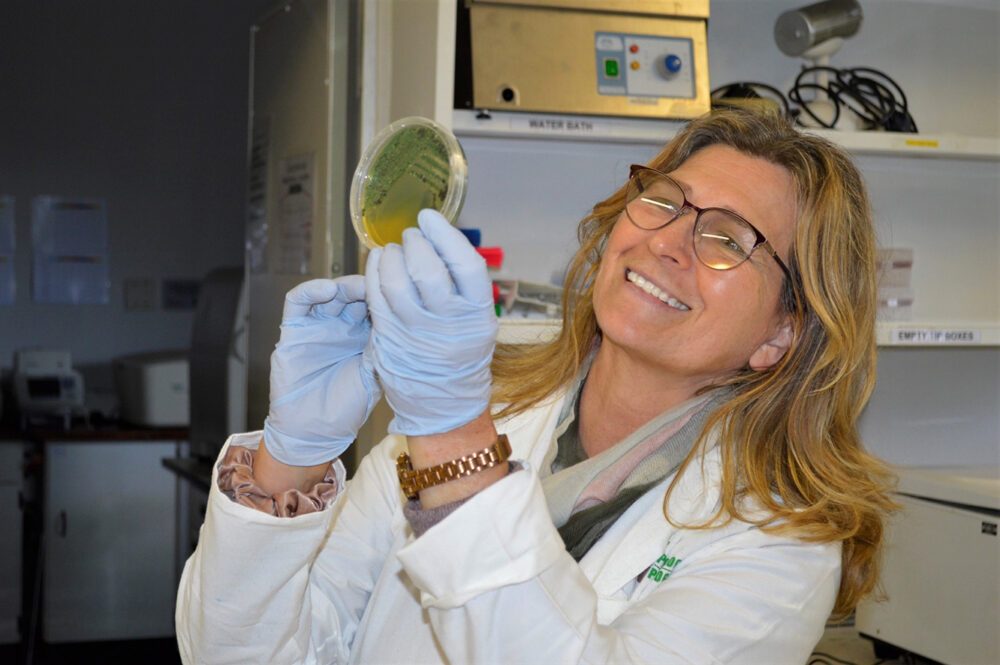 Prof Liza Korsten has been honoured for a lifetime of turning science into action, safeguarding food supplies through her work in plant pathology and microbiology.
Prof Liza Korsten has been honoured for a lifetime of turning science into action, safeguarding food supplies through her work in plant pathology and microbiology.
For Prof Liza Korsten, her journey as a scientist began not in a sterile lab, but under the open sky, among leaves and fields. As a girl, she was captivated by the natural world, particularly by plants. This curiosity matured into a passion for plant pathology, a niche field that would soon prove vital in tackling one of the most pressing challenges of our time: food security.
“Science became my life’s work, research my passion and mentoring students my mission,” she recalls.
Now recognised with the prestigious NSTF-South32 Lifetime Award, Korsten reflects on a four-decade career that has seen her evolve from a plant pathologist tinkering with fungi to an internationally renowned scientist influencing food policy, championing sustainability and mentoring a new generation of African researchers.
Seeds of curiosity, roots of purpose
Her foundation in microbiology laid the groundwork for breakthroughs in understanding plant-pathogen interactions.
“I always knew I wanted to work with nature,” says Korsten. “Plant pathology became a calling, combining my love of biology with real-world impact. It connected my scientific interest with a moral purpose: to make food safer for everyone.”
Her career began with a groundbreaking contribution: developing South Africa’s first biological control agent for leaf and fruit diseases. At a time when chemical pesticides dominated agriculture, her innovation was a game-changer, offering a safer, environmentally friendly solution that is now standard practice for sustainable farming.
“Today, these products benefit both farmers and consumers,” she says. “But back then, it took courage and conviction to offer something new.”
Food safety from soil to table, lab to land
But she didn’t stop there. As trade and public health demands increased, her focus expanded. “Food safety became central. I realised that ensuring the quality and safety of fresh produce wasn’t just about pathogens, it was about the entire food system, from soil to table.”
This systems-thinking approach positioned her at the forefront of a new kind of science — one that blends microbiology, plant pathology, policy and regulation to address food security in a rapidly changing world, while never losing sight of the farmer on the ground.
Korsten’s expertise has earned her positions on some of the world’s most influential food safety bodies, including the World Health Organisation (WHO), Food and Agricultural Organisation (FAO), Global Food Safety Initiative (GFSI), International Standards Organisation (ISO), and SA’s food security panels. Most recently, she joined the Academy of Science South Africa’s (ASSAf) new Food Safety forum.
“The selection to serve on these international and local forums reflects the international recognition of African science,” she notes. “It demonstrates the impact we have made and the wide recognition we have as South Africans.” Through these roles, she has shaped global food safety policies while ensuring solutions remain locally relevant.
Locally, she co-directed the DSTI-NRF Centre of Excellence in Food Security at the University of Pretoria, built ISO-accredited food safety labs and advised national policy panels. “Safe food is a basic human right, and food security is a moral obligation,” she says.
Embracing change, leading with grit
What makes Korsten’s work unique is her ability to straddle the worlds of high-tech science and practical farming.
“Agriculture is applied by nature,” she says. “Science only matters if it reaches the farmer, the policymaker and the consumer.”
From genome sequencing to postharvest quality apps, her work blends innovation with application.
“Farmers are incredibly resourceful,” she says. “Engaging with them has been humbling — they work the land with inherent knowledge of nature and the many challenges they face daily.”
Among her toughest scientific challenges was tackling Huanglongbing or citrus greening disease, a destructive crop disease caused by a bacterium that defied traditional isolation methods.
“It was frustrating, but shifting to molecular diagnostics was crucial for progress and reflected the importance of adaptation in a rapidly changing science space,” she recalls. “It taught me something essential: adapt or die.”
She turned to molecular diagnostics and PCR, embracing new technologies that would redefine disease detection. Now, as AI and digital agriculture reshape the research landscape again, Korsten is once more at the cutting edge, integrating tools such asTomatoSmart and SmartSpud into postharvest monitoring and quality control.
“These tools will transform how we detect, monitor and prevent contamination,” she says. “We must evolve with them.”
A legacy of leadership
Of all her achievements, Korsten is proudest of her students. She has mentored more than 87 MSc and PhD graduates and about 60 honours students, many of whom now lead scientific projects across Africa.
“Young scientists are our future, so mentorship isn’t a side project — it’s central to how we build a sustainable, resilient science ecosystem,” she says, adding that another priority must be science communication, innovation and policy training. “Publishing isn’t enough anymore. We need to translate knowledge into impact.”
As a leader in the African Academy of Sciences ARISE-SD programme, she supports 600 researchers in 38 countries, building a collaborative African research network. “We’re creating a science community that’s connected, confident and capable.”
Her passion for empowering women in science is equally strong. “We need more women in leadership, in labs, and in policy rooms. Equity in science means stronger, more diverse solutions.”
Impact, recognition, and purpose
Her current focus? Understanding antimicrobial resistance in the water-plant-food nexus, a field that bridges food safety with global health and environmental sustainability.
“Food safety is no longer just about bacteria on a leaf,” she explains. “It’s about how water, climate and chemicals intersect with health.”
Despite her international accolades, including ranking in the top 2% of scientists globally, Korsten remains grounded in her purpose. “Science should improve lives. It’s not just a career. It’s a lifestyle. And it’s fun.”
Her influence spans continents, institutions and generations, but accolades are not what drive her: “The NSTF-South32 Lifetime Award isn’t just for me. It honours every student, farmer, and colleague who’s walked this road with me.”
She believes recognition is essential to spark public interest in science. “Awards show society what’s possible. They inspire young people, attract funding, and remind us that science matters.”
Looking forward
Even after four decades, Korsten’s passion burns brightly. Her next goals include: advancing research on microbiomes and antimicrobial resistance; scaling postharvest innovations to reduce food waste; expanding pan-African scientific collaboration; and mentoring the next generation of changemakers.
Her advice to young researchers is clear: “Tackle problems that matter to society, work across fields to solve complex challenges, and train others with passion to multiply your impact.”
Her vision? A future where science serves society, not just statistics: “That every learner in SA knows where their food comes from, trusts its safety, and sees a scientist behind every nutritious bite.”
TW Kambule-NSTF Researcher Award
The cosmic detective
Stellenbosch astrophysicist Prof Yin-Zhe Ma leads the hunt for the Universe’s ‘missing matter’
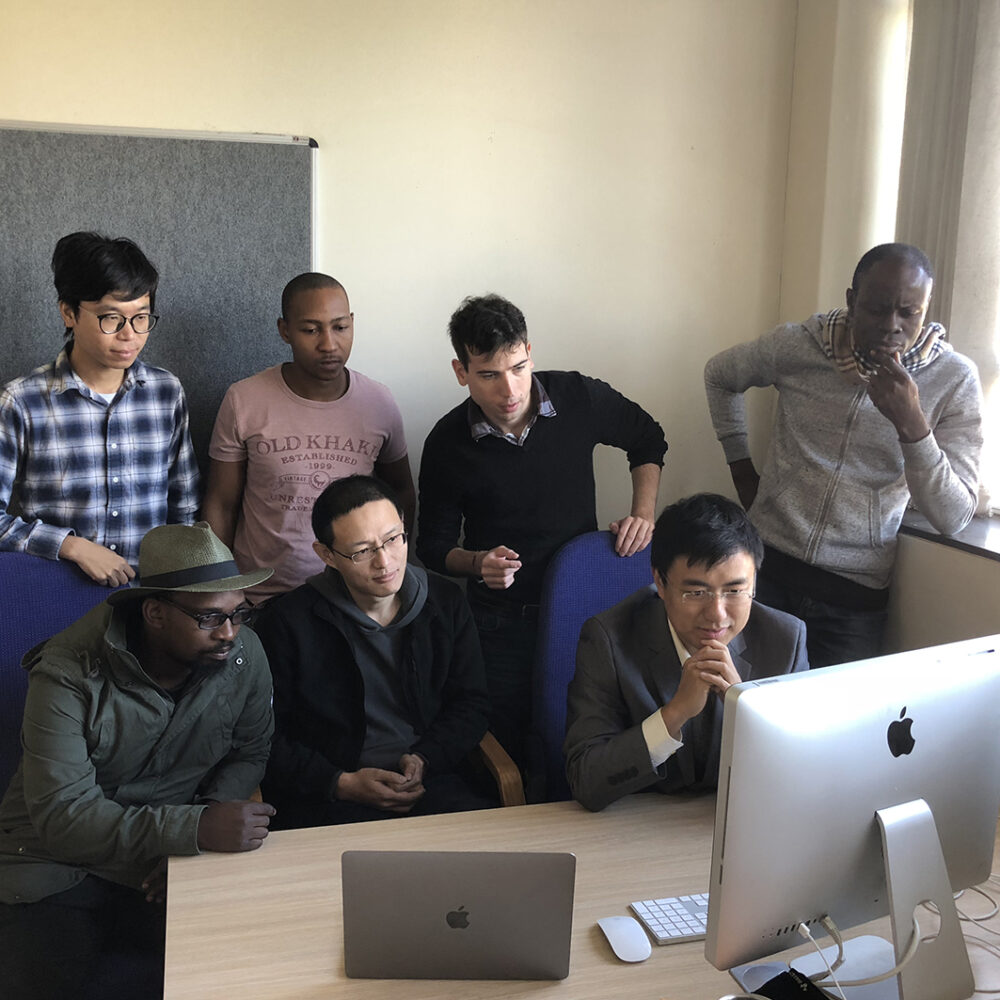 In his search for the ‘missing baryons’, Prof Yin-Zhe Ma offers a critical contribution to the
In his search for the ‘missing baryons’, Prof Yin-Zhe Ma offers a critical contribution to the
understanding of galaxy formation and evolution.
When most people gaze at the stars, they see beauty. Prof Yin-Zhe Ma sees puzzles — vast cosmic mysteries woven into the fabric of space and time. One of the most perplexing of these is the case of the Universe’s missing matter, and he’s made it his mission to find it.
“From the cosmic microwave background, we know that baryons — the building blocks of matter like protons and neutrons — make up about 4.8% of the universe’s total density,” explains Ma, an astrophysicist and full professor at Stellenbosch University. “But when we look around, we can only see 10% of those. The rest are diffuse, hidden in vast webs of gas between galaxies, nearly impossible to detect with traditional methods.”
This cosmic gas exists in a temperature sweet spot that makes it nearly invisible — too cool to emit detectable X-rays, too warm to form stars. But Ma, the recipient of the NSTF-South32 TW Kambule Researcher Award, has not been deterred: “My work is to develop new estimators that extract these invisible signals from vast datasets.”
His approach combines multiple astronomical surveys — galaxy surveys, gravitational lensing and the Sunyaev-Zeldovich effect—– to tease out incredibly weak signals from cosmic data. His breakthrough came when he realised that the Canada-France-Hawaii Telescope Lensing Survey had accumulated enough data to achieve detection when cross-correlated with Planck satellite observations.
“This tells us not just where matter is, but how galaxies form and evolve, and how energy flows through the cosmos,” he explains. “I stand at the ‘edge of discovery’ and always keep both theories and observations in mind to be the first to achieve detection if the data becomes mature.”
Ma’s fascination with the stars began as a child, but it was a fateful lecture at Nanjing University in 2003 by renowned Chinese cosmologist Prof Tan Lu that lit the spark: “He explained dark matter and neutrinos so simply, and I was hooked. I followed him to the bus stop after the talk, full of questions. His wife gave me their home phone number – she could tell I was serious. That night changed everything.”
Now based in South Africa, Ma is building the country’s reputation as a hub for computational astronomy: “Science isn’t mainstream here yet. People come for beautiful scenery, tasty wines, exotic animals — but not for astrophysics. That must change. Our future depends on building scientific capacity.”
He brings the universe down to earth for students and the public alike. “Nobody likes equations, dry concepts or rules, but everyone loves stories,” he says. “I ask them: Where does your gold ring come from? The answer? Neutron star collisions.”
His advice to young scientists? “Build a solid foundation in physics and mathematics. I don’t think they are separate work — they’re part of my life. Do you think my first language is Chinese? Absolutely not! My first language is equations.”
For Ma, the NSTF-South32 Award is more than personal recognition. “It’s a message that science matters in SA. We are not spectators – we are contributors to the global conversation.”
TW Kambule-NSTF Award: Emerging Researcher
The wastewater whizz
Dr Emmanuel Kweinor Tetteh reengineers sustainability, one biogas bubble at a time
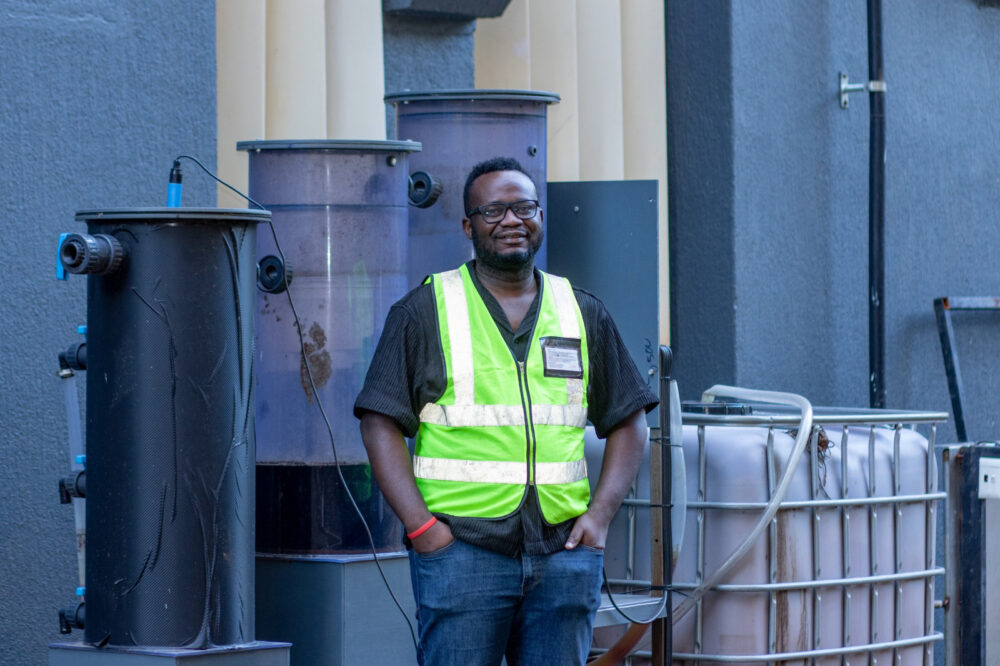 Dr Emmanuel Kweinor Tetteh’s multidisciplinary research interest continues to actively shape
Dr Emmanuel Kweinor Tetteh’s multidisciplinary research interest continues to actively shape
sustainable environmental engineering.
Growing up in Akim-Akwatia, a diamond-mining town in Ghana, Dr Emmanuel Kweinor Tetteh witnessed the environmental and social fallout of poor wastewater management.
“It was destroying communities, poisoning ecosystems, and perpetuating poverty,” recalls Tetteh, now a senior researcher at Durban University of Technology and winner of the NSTF-South32 Award for emerging researchers. “It was a pivotal moment that made me realise how engineering solutions, particularly those linking water and energy, can change lives.”
Today, he leads transformative projects supported by the Water Research Commission and the South African National Energy Development Institute (SANEDI). His focus? Developing smart, scalable technologies that tackle water, waste, and energy challenges, all while creating socio-economic value for vulnerable communities.
At the core of his work is the Smart Wastewater-to-Energy System (SWTES), a homegrown solution developed from his PhD research. This adaptable, smart system treats high-strength wastewater, generates biogas for renewable energy and produces irrigation-quality water.
It is circular economy thinking at its finest, addressing multiple crises simultaneously. “Our system integrates anaerobic digestion, advanced oxidation and digital monitoring. It reduces emissions, enhances food and energy security, and creates value from waste.”
Proven in industrial pilots — from sugar refineries to oil plants — SWTES has enabled oil recovery, achieved zero waste discharge and created multiple revenue streams through electricity generation, biochar, and even construction materials like bio-bricks.
But he’s quick to point out that success isn’t just about technology. “My passion lies in applying engineering science to solve real-world problems. South African municipalities, particularly in KwaZulu-Natal, face immense pressure to deliver water and sanitation services amid rising energy costs and ageing infrastructure.”
Dr Tetteh holds an NRF Y2 rating and has authored more than 60 peer-reviewed publications. Yet, it’s mentorship that brings him the greatest pride.
“Two of my postgraduate students have won the ENI Young Talent Researcher from Africa Award — the same award I received in 2019 in Rome,” he says. “That moment, standing in the Quirinal Palace and representing Africa, validated that our innovations can lead globally.”
The path hasn’t been easy. Permit issues as an international scholar, limited funding and infrastructural constraints tested his resolve.
“These challenges taught me resilience and the importance of strategic partnerships,” he reflects.
Currently spearheading green hydrogen research and plastic-to-energy innovations, Tetteh uses AI modelling, digital monitoring tools and life-cycle assessments to ensure his work is not only groundbreaking but also scalable and sustainable.
“Success isn’t just peer-reviewed papers,” he says. “It’s real-world impact. When technologies like SWTES are deployed across Africa, embedded in policy, and helping people, that’s when I’ll know we’ve made it.”
For this engineer, the NSTF-South32 win extends beyond personal validation: “It sends a powerful message to future scientists: their work matters, their voices count, and their efforts are essential in building a resilient and sustainable future for SA and the continent.”
TW Kambule-NSTF Award: Emerging Researcher
The fungal fighter
Neuroscientist Dr Rachael Dangarembizi tackles deadly brain infections head-on
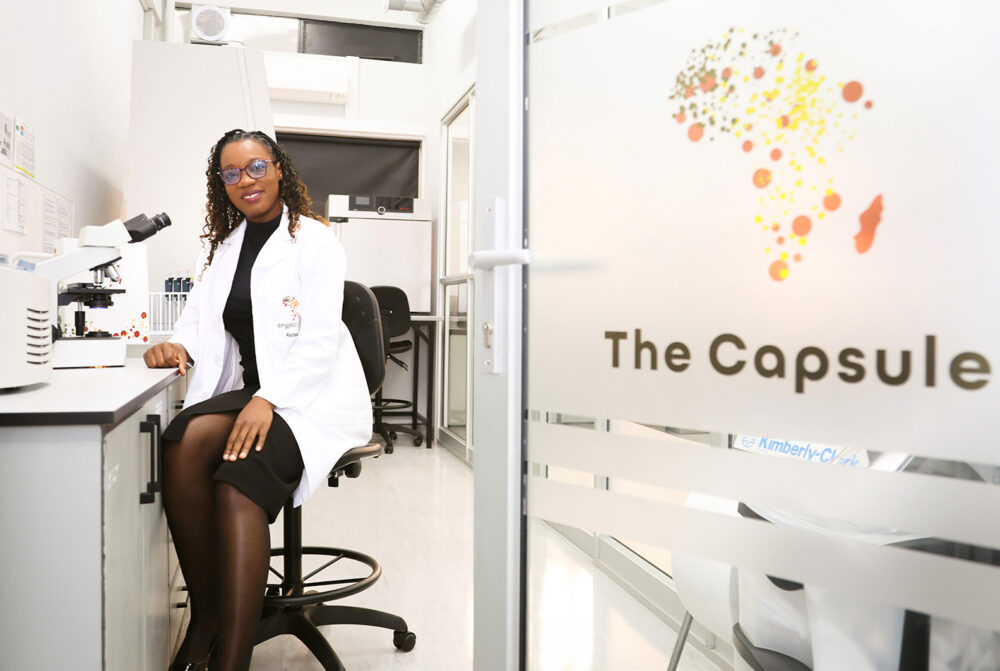 Dr Rachael Dangarembizi has earned global recognition for her groundbreaking work on
Dr Rachael Dangarembizi has earned global recognition for her groundbreaking work on
cryptococcal meningitis, while mentoring the trailblazers of tomorrow.
A deadly fungal infection is claiming more lives in sub-Saharan Africa than tuberculosis among people living with HIV, yet few outside the continent even know its name. Cryptococcal meningitis is a silent killer, but Dr Rachael Dangarembizi is making sure it doesn’t stay that way.
As a neuroscientist, a rising star in African biomedical research, and now the winner of the TW Kambule-NSTF Award: Emerging Researcher, she’s leading the fight against this overlooked epidemic.
“My research is focused on studying the causes of brain injury in cryptococcal meningitis,” she explains. “It’s a neglected but deadly fungal infection that’s extremely difficult to treat and is a leading cause of death for people living with HIV/AIDS in sub-Saharan Africa.”
Her passion is both personal and professional. “Growing up in Southern Africa, I witnessed firsthand the devastating consequences of HIV-associated infections. We lost family and friends. I believe in the power and potential of science to generate solutions and have dedicated my career to tackling one of the biggest challenges that Africa has and continues to grapple with today.”
This commitment led her to establish the first laboratory in Africa dedicated to studying brain injury caused by cryptococcal meningitis — a significant milestone, especially considering she had to travel to Europe for such work during her PhD. “Five years after finishing my doctorate, I’ve set up a lab where we can now train and mentor young African scientists to do globally competitive science. That’s what keeps me going.”
But the road has not been easy.
“Conducting biomedical research in Africa presents daily challenges, from limited funding to underdeveloped infrastructure. Research on cryptococcal infections has long been neglected,” she says. “These constraints have forced me to be resilient and resourceful. They’ve taught me that scientific progress is rarely linear.”
Her team’s work doesn’t stay in the lab. It directly influences the shaping of health policy and treatment protocols across the continent.
“We’re generating powerful datasets to guide diagnosis, treatment and policy,” she explains. “Our ultimate aim is to develop more affordable and accessible therapies for the communities we serve.”
For Dangarembizi, professional success is defined by impact: “It’s not about papers or awards. It’s about building sustainable research capacity, especially for women and historically excluded groups. I’ll know I’ve succeeded when there’s an army of African scientists leading labs across the continent.”
She’s also excited by the emergence of advanced technologies in African labs. “Tools like spatial transcriptomics, advanced imaging, and artificial intelligence are finally becoming accessible here. Future solutions to some of our greatest challenges will come from places that have long been overlooked. With the right support, we can solve health challenges faster and more effectively than ever before.”
She says rewards like the NSTF-South32 Awards don’t just recognise individuals, but raise the visibility of African science. “They remind us that science is a collective, transformative force.”
Her advice to young researchers: “Ask questions that matter. Don’t wait for perfect conditions — they never come. Build networks. You can’t do this alone.”
Management Award
The legendary leader
From late bloomer to cybersecurity champion, Dr Jabu Mtsweni is leading from the front
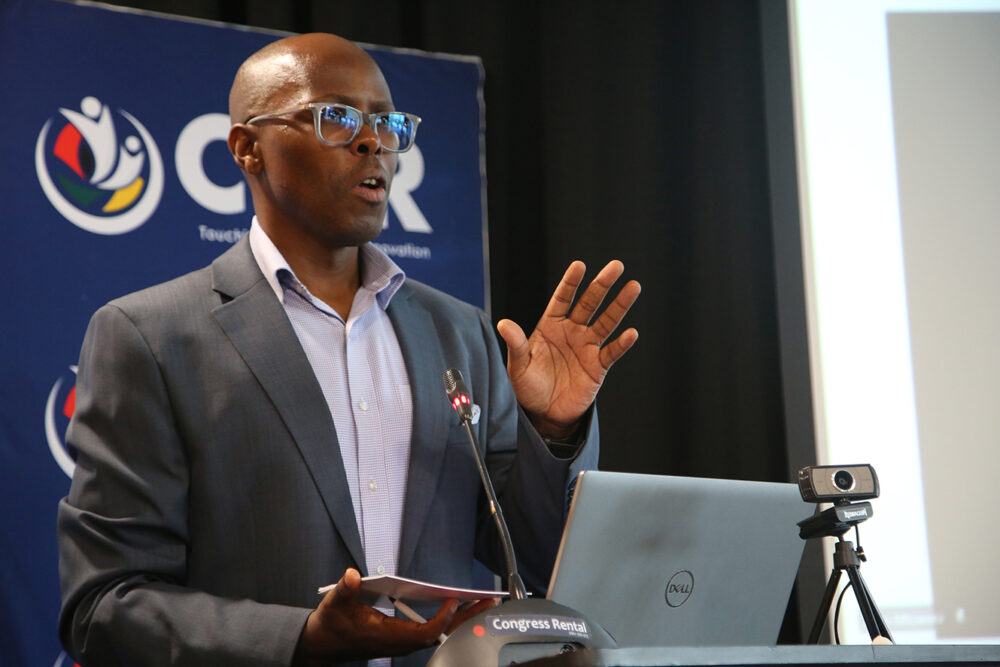 Dr Jabu Mtsweni leads his team from the front, developing and deploying solutions while shaping national policy and building
Dr Jabu Mtsweni leads his team from the front, developing and deploying solutions while shaping national policy and building
SA’s cybersecurity capacity.
When Dr Jabu Mtsweni applied late for university, he didn’t even know how to use a computer. Today, he’s head of the Information and Cyber Security Centre at the Council for Scientific and Industrial Research (CSIR), leading one of South Africa’s most innovative digital defence initiatives and fostering a future that is local, inclusive and secure.
“I wanted to be an accountant and only ended up in computer engineering because it was the last space left,” he laughs. “But once I got started, I fell in love with the field and knew I had found my purpose.”
Since taking the helm at the CSIR in 2019, Mtsweni has transformed a bare-bones unit into a national powerhouse. What began with a handful of researchers has grown into a team of nearly 90, with annual revenue surpassing R100 million. But for Mtsweni, it’s not just about numbers.
“We didn’t just want to build a centre — we wanted to build a movement,” he says. “Cybersecurity is often dominated by foreign tech. Our goal has always been to create home-grown solutions that support a capable state and stimulate local innovation.”
His commitment was especially evident during the Covid-19 pandemic, when he led the launch of the National Policy Data Observatory in partnership with the Department of Science, Technology and Innovation — a real-time data platform that has since become a national asset.
In 2023, the Centre launched VeristicPrint, SA’s first patented biometric authentication technology, and signed more than 10 licensing agreements with startups and small businesses. “This rapid expansion shows that intentional leadership isn’t just impactful; it’s essential for driving scientific and technological growth that benefits the broader community.”
Yet, what matters most to him isn’t patents or accolades: “Leadership has always been an intrinsic part of who I am, and my proudest achievement is building people. I’ve always believed that as I rise, I must lift others too.”
His leadership style is adaptive and human-centred. “A ‘one-size-fits-all’ approach doesn’t work. By tailoring my approach to each team member, I can maximise their contributions and allow emerging leaders to step up and share the load. This builds capacity while fostering a culture of distributed leadership.”
Still, retaining talent remains a challenge. “I was thrilled to recruit two brilliant female leaders,” he says. “But within two years, both were snapped up by industry and academia. It’s bittersweet. It shows we’re developing leaders — but also that we need to strengthen our organisational culture.”
His advice to future leaders? “Consistency, persistence, and action. It’s not enough to talk about leadership — you must demonstrate it through your deeds. Never forget that true leadership development is accelerated and enriched by the guidance, insight and wisdom of those who’ve gone before you.”
Being honoured with the NSTF-South32 Management Award, he says, is both humbling and motivating. “While awards are never the goal, they remind us that impact matters. STEM [science, technology, engineering and maths] is not just about bright minds in labs — it’s also about those who lead, mentor, and drive innovation from vision to impact.”
Engineering Research Capacity Development Award
The barrier breaker
Prof Anne Fitchett is engineering a more inclusive future
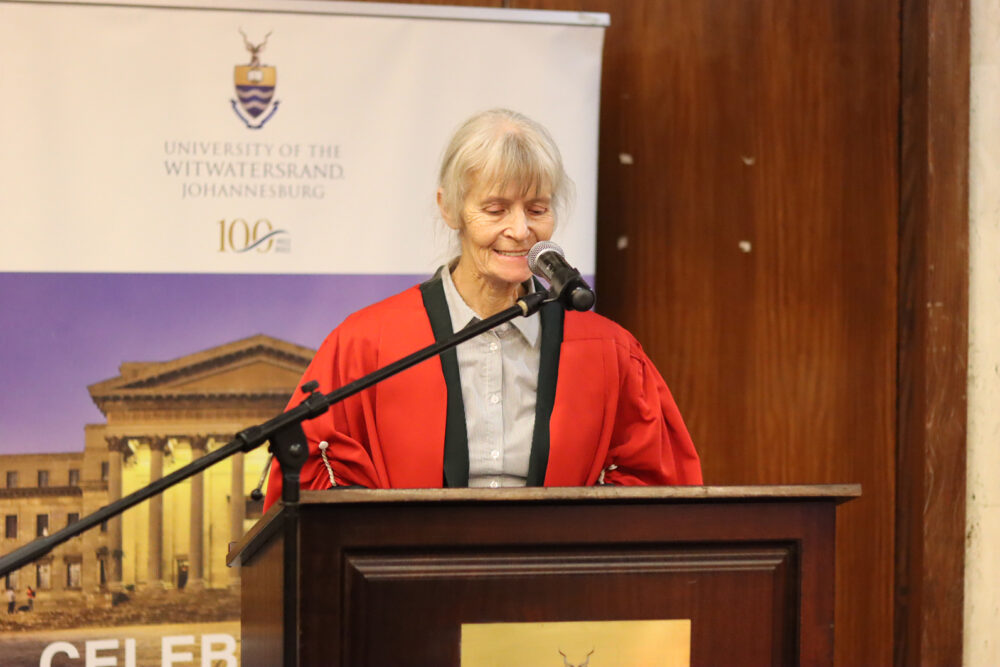 Prof Anne Fitchett has been instrumental in creating new pathways for those historically excluded from engineering.
Prof Anne Fitchett has been instrumental in creating new pathways for those historically excluded from engineering.
In a field often seen as rigid and exclusive, Prof Anne Fitchett has built a career doing the opposite — breaking down barriers and creating new pathways for those historically excluded from engineering.
“I’ve always believed our role as educators goes far beyond the lecture hall,” she says. “We are here to nurture lifelong learners and future problem-solvers who can carry the profession forward with innovation and integrity.”
Fitchett is an honorary associate professor at the University of the Witwatersrand (Wits) and served as assistant dean in the Faculty of Engineering and the Built Environment before retiring. She has received the NSTF-South32 Award for Engineering Research Capacity Development, recognising her decades-long commitment to reshaping how engineering is taught — and who gets to learn it.
“We live in a region with a severe shortage of engineers, which inhibits economic growth and infrastructure delivery,” she says, citing load-shedding as an example of what happens when engineering capacity can’t meet demand.
At Wits, she led major curriculum reforms, including the introduction of a Common First Year — a foundational programme that replaced high failure rates with improved student success and deeper engagement.
“Before its introduction, the first year was de facto a gatekeeping year,” she says. Her team’s cross-disciplinary approach integrated engineering, science, humanities and ethics, resulting in what she calls “a programme more holistic and better aligned with the ethos of the engineering profession”.
Fitchett also designed a part-time study track to address the thousands of eligible applicants turned away each year because of financial barriers. The programme spreads the first two years over four, with after-hours classes that allow students to work while studying. “It’s about giving people the tools and the time to succeed.”
Her focus on accessibility extended to physical and academic inclusion. Working with the Wits Disability Rights Unit, she helped pilot universal accessibility measures on campus, from infrastructure to tech-enabled learning. “When you create systems that support all learners, you create a stronger and more inclusive profession.”
She championed project-based learning and led Wits’s participation in the Engineering Without Borders Global Challenge, where student teams designed real-world solutions for vulnerable communities. Under her guidance, Wits won twice in three years. “The feedback was phenomenal when students saw how engineering could uplift communities and solve tangible problems.”
Beyond teaching, she has supervised numerous MSc and PhD students, often working with professionals juggling full-time jobs. Her secret? Meeting students where they are and co-creating research paths that align with their passions.
“The most important thing,” she says, “is that their work feels meaningful. Success isn’t only in the numbers. It’s in the conversations years later, when someone tells you that something you did helped shape their career.”
She is honoured by the NSTF recognition but quick to share credit: “Ultimately, this award recognises a number of my colleagues in both the academic and administrative parts of the university. Building research capacity is a multi-faceted endeavour and a team effort, and I am proud to have been a part of this throughout my academic career.”
Engineering Research Capacity Development Award
Driven to innovate
From research labs to off-road rigs, Vehicle Dynamics Group is training the engineers of tomorrow
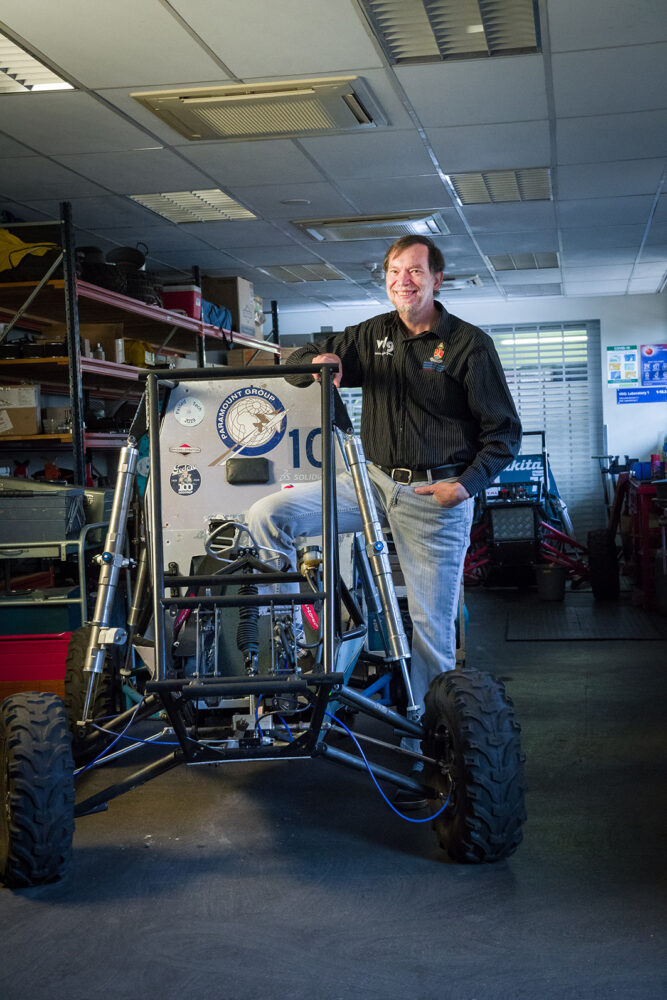 According to Prof Pieter Schalk Els, a student-first mentorship approach lies at the heart of their success at Vehicle Dynamics Group.
According to Prof Pieter Schalk Els, a student-first mentorship approach lies at the heart of their success at Vehicle Dynamics Group.
At the University of Pretoria’s Department of Mechanical Engineering, the Vehicle Dynamics Group (VDG) is driving change — literally and figuratively. This year, the small but effective team, led by Prof Pieter Schalk Els, earned an Engineering Research Capacity Development Award in recognition of their pioneering work in off-road vehicle technologies and postgraduate training.
Specialising in heavy-duty vehicles used in mining, agriculture, construction and forestry, VDG plays a pivotal role in the industries that power South Africa’s economy.
“From bicycles to bulldozers, vehicles are central to the economy of the world and play a major role in the lives and livelihoods of its citizens,” Els explains. “Our focus is on the heavyweights — machines that move tonnes of material over rough terrain and under extreme conditions.”
VDG’s research spans a wide range of applications — including tyre testing, advanced mechatronics to improve ride comfort and collision-prevention systems for large vehicles — that is already transforming international mining safety standards.
“We’re very well positioned in terms of simulation and testing capabilities, and we’re facing the kind of complex challenges that drive meaningful research,” Els explains.
But the group doesn’t see a divide between pure science and practical application: “An involvement in real-world engineering is the most efficient way to identify research gaps and needs, which we then seamlessly fill, all while giving our students the best possible exposure to the academic and real-world sides of the field. Our breakthroughs are born at the boundary between what is and what’s possible.”
This seamless connection between industry needs and academic exploration has helped VDG attract top talent and forge international partnerships. To date, the group has trained and graduated more than 50 postgraduate students, many of whom now hold influential positions around the world.
“Our students are the real impact of our work,” says Els. “We’re proud of the research papers, but our greatest legacy is the calibre of people we send into the world.”
This student-first mentorship approach lies at the heart of their success: “All you can do is show students why the work matters — and then give them the space to thrive. That’s the secret to building strong postgraduate programmes. You have to be openly passionate, ignite their curiosity and create an environment where they can become the best version of themselves.”
Now, the group is looking to the future, developing AI-driven systems and autonomous vehicle technologies for off-road applications. Their work in rough-terrain collision prevention is opening doors to international collaborations, showing that South African engineering is not just keeping pace, but setting the pace.
Winning an NSTF-South32 Award not only validates the team’s contributions, it shines a spotlight on the untapped potential of local engineering excellence.
“Many excellent research efforts in SA are not well known locally, although our researchers have high international visibility. These awards give South African science the recognition it deserves,” says Els. “We hope it encourages more collaboration — and more students to join us on the journey.”
For young engineers, Els offers simple but powerful advice: “Find something that makes you tick, and a mentor who inspires you. At VDG, your only limit is yourself.”
NSTF-Water Research Commission (WRC) Award
The water warrior
Prof Bongani Ncube’s mission to put water back in the hands of the people
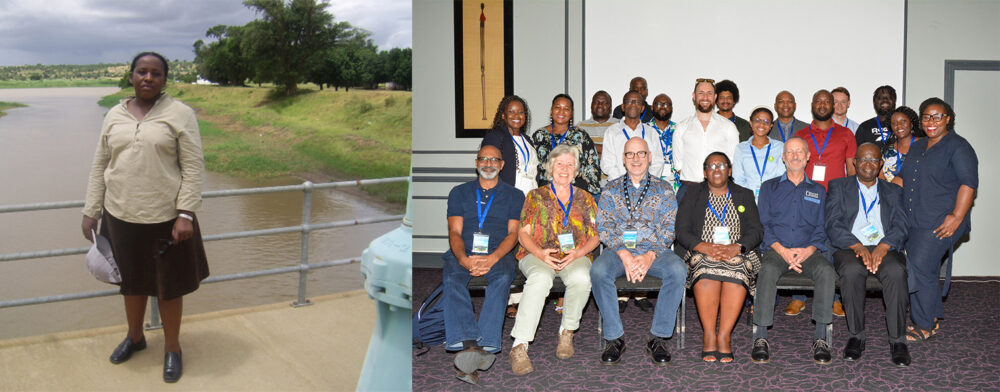 Prof Bongani Ncube has dedicated her life to address complex water governance issues to ensure equitable access for all.
Prof Bongani Ncube has dedicated her life to address complex water governance issues to ensure equitable access for all.
From the parched soil of rural Zimbabwe to the policy corridors of South Africa, Prof Bongani Ncube has never lost sight of one truth: water is life, and access to it must be just.
“I was born and raised in the village, and I am the daughter of smallholder farmers,” she reflects. “Working in water and agriculture was part of my upbringing.”
That upbringing now fuels a career at the forefront of the continent’s water revolution, earning her the NSTF-WRC Award of the prestigious NSTF-South32 Awards.
As the SARChI Chair in Governance and Economics for Water and Sanitation Sector Institutions at Cape Peninsula University of Technology (CPUT), Ncube is leading a transdisciplinary research agenda that fuses engineering, economics, governance and grassroots knowledge. Her team includes 30 postgraduate students across three faculties and five South African universities — a growing community of practice working to transform water governance and economics from policy to practice.
But her greatest strength lies in the way she works, ensuring that those most affected by water scarcity are finally heard, valued, and empowered.
“We don’t just research communities; we work with them,” she explains. “We value their lived experience as much as academic expertise.”
Her eureka moment came in 2013 during research into indigenous knowledge and drought. “Doing interviews with smallholder farmers, all I could hear was the unequal access to water and how emerging and subsistence farmers struggled to access the resource. I saw a huge gap in understanding the challenges they faced.”
That gap became her life’s work. While SA may have “world-class water legislation and policies”, she says that implementation is still uneven, and smallholder farmers face barriers that can take decades to overcome.
Ncube’s solution? Rethink the system. Her participatory research model makes farmers active and equal partners in co-developing solutions. In one project, this approach built trust between farmers and institutions, unlocking additional funding from the Breede-Olifants Catchment Management Agency and the Water Research Commission.
The outcome was a multilingual Farmer Information Package, freely available online in English, Afrikaans and isiXhosa.
“Trust was not just built between the farmers and institutions,” she adds, “but also among the farmers themselves.”
Her work goes beyond technical fixes — it’s about shifting power. “One farmer told me they see researchers as people who can compile and express farmers’ needs in ways the government recognises. I thought that summed up our role very well.”
But the journey hasn’t been easy. As a woman in male-dominated spaces, she’s faced barriers, prejudice and institutional resistance.
“I emigrated out of frustration after being overlooked for a leadership role,” she recalls. “But every detour taught me resilience. The work has always been bigger than me.”
Now, with global partnerships in France and Canada, her model is gaining international traction. “The future of water governance is collaborative, inclusive and just. We must keep building systems that honour the voices of those most affected — because that’s where true transformation begins.”
For Ncube, the NSTF-WRC Award is a shared milestone. “This isn’t just my win, it’s our win — the communities, farmers, students, collaborators and my institution. This award amplifies our collective voices and the work we’re doing together.”
NSTF-SAMRC Clinician-Scientist Award
Genomics for justice
Prof Shahida Moosa brings cutting-edge diagnostics to the continent’s most vulnerable patients
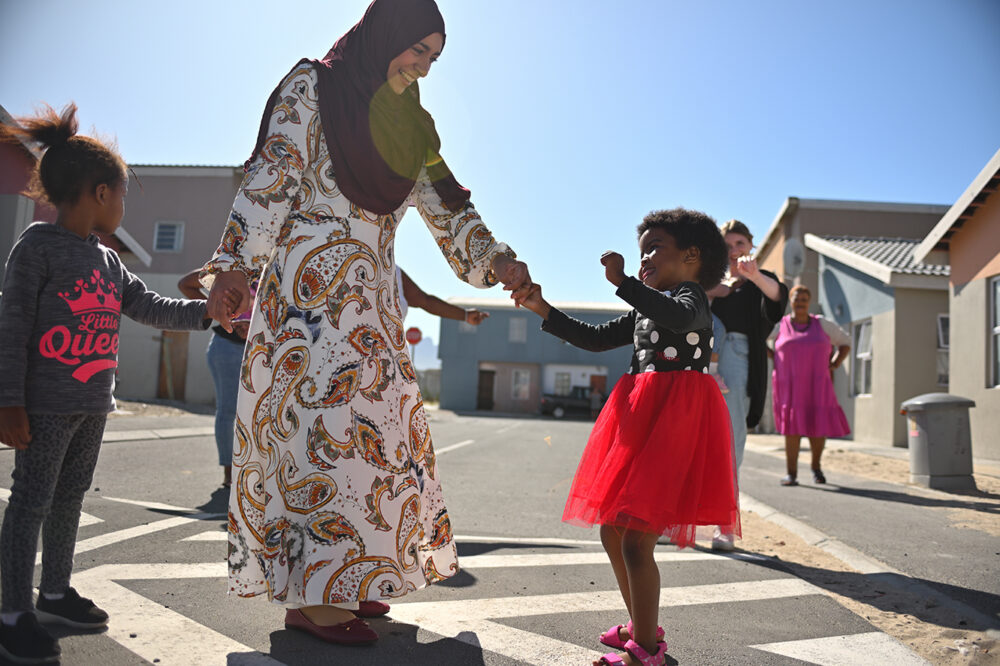 Prof Shahida Moosa knows the profound power of a diagnosis — not only for the child, but for their entire family.
Prof Shahida Moosa knows the profound power of a diagnosis — not only for the child, but for their entire family.
It was in a neonatal ward that a young medical officer encountered a puzzle that would reshape her career and help transform genomic medicine across Africa.
“It was a genetic diagnosis, and from that moment, I never looked back,” recalls Prof Shahida Moosa, winner of the NSTF-SAMRC Clinician-Scientist Award. “That experience showed me the profound power of a diagnosis — not only for the child, but for the entire family.”
Now head of medical genetics at Tygerberg Hospital and Stellenbosch University, Moosa is creating spaces where patient care and scientific discovery go hand in hand. With her team, she is working to ensure African families are not left behind in the global genomics movement — even when conditions are rare and answers hard to find.
“I always imagined I would become a paediatrician, but I found myself drawn to children with complex, unexplained conditions,” she says. “These were the patients for whom every test came back negative, and standard treatments offered little relief.”
Many of these cases had an underlying genetic basis. “I became acutely aware early in my career of the stark inequities patients face across the country. While the rest of the world embraced genomic medicine, I was limited to outdated tests that often didn’t reflect our population’s diversity.”
Even today, only a handful of clinics across sub-Saharan Africa offer specialised testing. “And yet, rare diseases affect more than 100 million people on the continent — more than the combined number living with HIV and TB. I meet these families every day. I couldn’t, and wouldn’t, walk away.”
After earning a PhD in Germany, she returned to South Africa to launch Genomics for Health in Africa (GHA), a programme offering free genetic testing and counselling, while training the next generation of African genomic scientists. “What began as a single-centre initiative has grown into a multinational programme providing not just access to medicine, but also knowledge, empowerment and community.”
One moment stands out: a mother who had blamed herself for her child’s condition for 21 years, thinking it was caused by cheese she ate during pregnancy. “When I explained it was genetic and not her fault, she broke down in tears. That reminded me why this work matters. Diagnosis isn’t just science — it’s healing.”
She also launched Africa’s first Undiagnosed Disease Programme and is pioneering the use of artificial intelligence to help clinicians identify rare conditions, even in remote settings. “By including African patients in these tools, we’re improving outcomes not only here, but for patients globally.”
Her advice to future changemakers? “Start with purpose, lead with empathy and never wait for permission. If the systems don’t serve your patients, build new ones — and bring others with you.”
Winning the Clinician-Scientist Award of the prestigious NSTF-South32 Awards, she says, brings visibility to the need for equity in genomics and the prioritisation of rare diseases: “We are proud to be part of a new era that moves beyond extractive, ‘helicopter’ science. The question is no longer whether we can do this in Africa, but how far we can lead.”
NSTF-TIA Green Economy Award
From waste to watts
Prof Nobanathi Maxakato turns trash into treasure with breakthrough fuel cell research
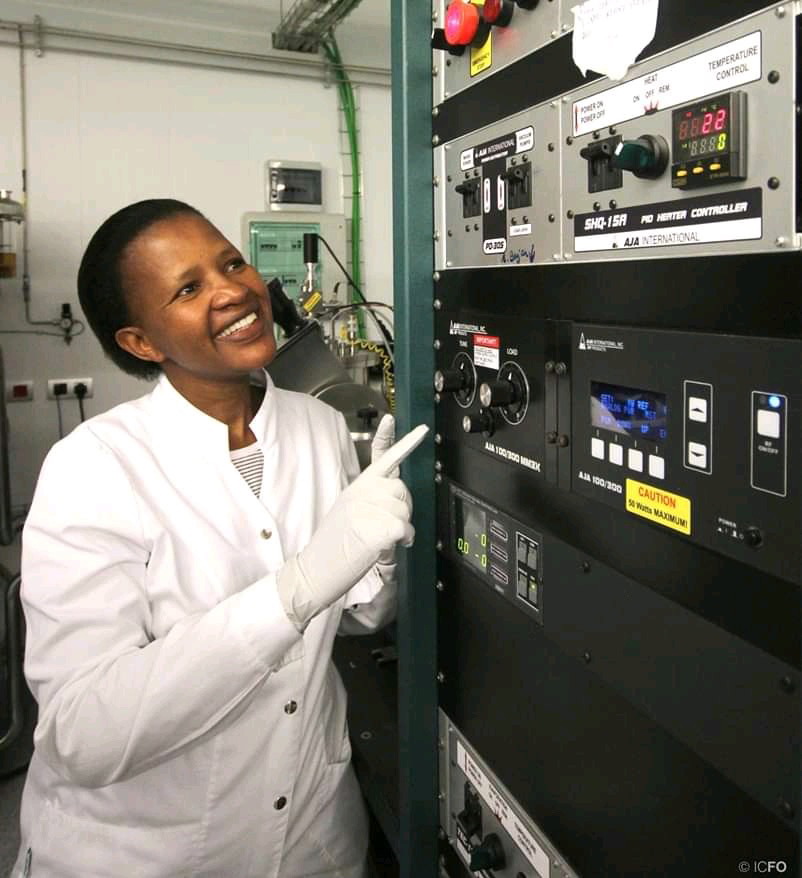 Prof Nobanathi Wendy Maxakato is pioneering research into sustainable pathways for green energy solutions by developing advanced electrocatalysts for fuel cell technology.
Prof Nobanathi Wendy Maxakato is pioneering research into sustainable pathways for green energy solutions by developing advanced electrocatalysts for fuel cell technology.
While the world races to decarbonise and South Africa battles crippling load-shedding, one scientist is proving that the solution might lie not in expensive imports or elusive technologies but in our trash. Associate Professor Nobanathi Wendy Maxakato is pioneering a radical path to clean, affordable energy using nanotech to turn everyday waste into high-performance fuel cell materials.
The recipient of the NSTF-TIA Green Economy Award, Maxakato’s research challenges the dominance of existing technologies while reimagining energy innovation as something local, inclusive and deeply sustainable.
Her work at the University of Johannesburg’s Department of Chemical Sciences tackles a key hurdle in fuel cell technology: replacing costly platinum group metals (PGMs) used in direct alcohol fuel cells (DAFCs). By synthesising a unique class of carbon nanomaterials composed of multiple concentric fullerene shells, known as carbon nano-onions, from agricultural and municipal waste through a low-energy flame pyrolysis process, Maxakato is developing affordable electrocatalysts that could power everything from vehicles to rural clinics.
Her journey into electrocatalysis began during her MSc at the University of the Western Cape and deepened during her PhD at the University of Pretoria.
“The technical complexity, societal relevance, and environmental urgency of this field sparked a deep, enduring interest,” she says. “I committed my research career to advancing solutions that support the global shift towards low-carbon energy systems.”
A breakthrough came in 2020, when her team developed a green flame pyrolysis method to synthesise carbon nano-onions from waste. This reduced energy input while maintaining high catalytic performance.
“It wasn’t just a technical achievement,” she explains. “It crystallised the impact of our broader vision — turning local waste challenges into clean energy solutions for the global good.”
With more than 65 peer-reviewed publications and more than 1700 citations, Maxakato believes success isn’t about numbers. “I define success by the real-world applicability of my research and by the success of the students and collaborators I’ve mentored.”
As SA continues to face energy insecurity and climate change, her innovations offer hope. “Fuel cells can help diversify our energy mix, alleviate load shedding, and reduce dependence on coal.”
Crucially, they can be used in decentralised, off-grid settings, essential for rural and under-resourced areas.
“Green energy can’t be for the elite,” she insists. “We must develop technologies that are culturally appropriate, locally relevant, and responsive to actual needs. A just transition must be fair and inclusive, ensuring no community is left behind.”
She’s forging international partnerships in Nigeria, Zimbabwe, Latvia and Germany, and incorporating tools such as machine learning, density functional theory and bio-based nanomaterials. Beyond the lab, she runs workshops and public lectures to advocate for clean energy and raise awareness of its environmental and economic benefits.
Despite limited infrastructure and funding, she sees constraints as catalysts: “By leveraging local strengths, embracing creativity and building collaborative networks, it’s possible to generate sustainable, globally relevant solutions.”
Winning the NSTF-TIA Green Economy Award is, for her, a springboard. “It’s recognition for green chemistry and inclusive science — and it gives me a bigger platform to inspire and mentor the next generation.”
Her advice to young researchers? “Be bold. Be interdisciplinary. Prioritise sustainability. And always connect your work to real-world needs. That’s where true impact happens.”
Science Diplomacy for Africa Award
The digital bridge builders
The Centre for Community Technologies turns African innovation into global conversation
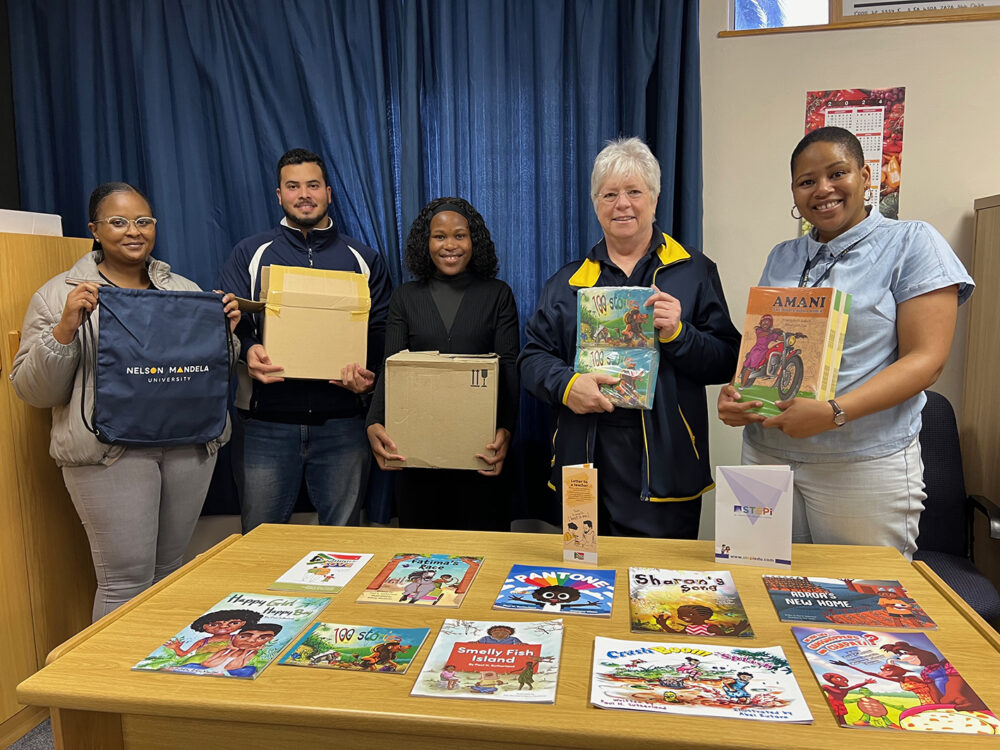 The Centre for Community Technologies (CCT) is using technology not just as a tool, but as a catalyst for sustainable development, social change and digital equity.
The Centre for Community Technologies (CCT) is using technology not just as a tool, but as a catalyst for sustainable development, social change and digital equity.
In a remote Ethiopian village, a mother treats her child’s fever using a mobile app. In rural South Africa, a farmer boosts her yield by testing soil quality via her cellphone. An elderly man banks online, saving himself a day-long trip to town.
For Prof Darelle van Greunen and her team at the Centre for Community Technologies (CCT), this is what science diplomacy looks like — not summits or formal treaties, but lives changed because technology was designed with those lives in mind.
Under Van Greunen’s leadership as director and founder of the CCT at Nelson Mandela University, the centre is spearheading a people-first approach to digital inclusion. Their work, recognised with the Science Diplomacy for Africa Award, is built on a radical idea: the most powerful innovations emerge when communities drive the solutions.
“Our core philosophy is to showcase Africa’s capabilities — created in Africa, for Africa, by Africans,” she says. “We don’t start with the technology; we start with the challenge. We listen first. Then we build together.”
That principle underpins every project. Rather than parachuting in pre-built tech, the CCT team works hand-in-hand with communities to design solutions that are context-specific, culturally grounded, and sustainable.
“We measure success not just by downloads or data,” Van Greunen notes. “It’s in the stories. A mother understands her child’s symptoms. A farmer doubles her harvest. Those are our milestones.”
Their work extends across the continent, from SA to Ethiopia, Malawi, Uganda and Kenya, through partnerships with governments, universities and NGOs. This has established the CCT as a diplomatic force, acting as a knowledge broker between previously disconnected stakeholders and siloed sectors.
“Science diplomacy means using our expertise and partnerships to connect communities, researchers, and governments in solving shared challenges,” Van Greunen explains. “We build not only tools, but trust — bridging the gap between policy and lived experience.”
But for Van Greunen and her team, sustainability goes beyond technological solutions. “It means building capacity and empowering local communities while fostering local ownership.”
This philosophy ensures that communities can manage and evolve the solutions long after her team has moved on.
Beyond technology, she says CCT is driven by a broader vision for Africa’s future. “To unlock Africa’s full potential, we must focus on bridging technology and human development in areas like climate resilience, digital health, and inclusive education that balance technical skills with human-centred competencies like ethics, empathy and critical thinking.”
Van Greunen and her team see the NSTF award as both recognition and fuel. “It validates the hard work we’ve put into making sure innovation starts with people, and inspires us to go further, reach more communities, and continue building technology that truly listens.”
The stakes, she warns, couldn’t be higher. “If we fail, we risk deepening the digital divide and marginalising vulnerable groups. But if we lead with empathy, inclusion, and local knowledge, we can shape a digital future that belongs to all of us.”
Special Annual Theme Award: Quantum Science and Technology
Taking a quantum leap
From teleportation to crime-fighting, Prof Andrew Forbes is turning Africa into a future-ready powerhouse
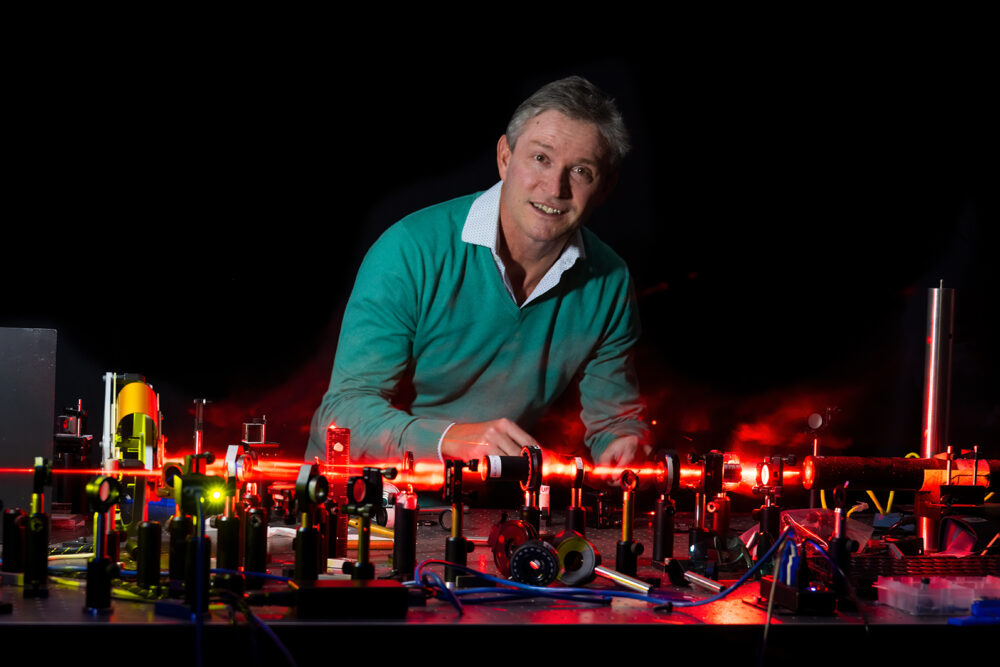 Prof Andrew Forbes and his team were the first on the continent to demonstrate quantum entanglement, ensuring that the quantum revolution did not pass Africa by.
Prof Andrew Forbes and his team were the first on the continent to demonstrate quantum entanglement, ensuring that the quantum revolution did not pass Africa by.
When most people think of quantum physics, they picture science fiction — teleportation, secret codes and mysterious “entanglements”. But for Prof Andrew Forbes, these are not futuristic fantasies. They’re real, and they’re happening in his Johannesburg-based lab.
As Director of SA QuTI (South African Quantum Technology Initiative), Forbes and his team were the first in Africa to demonstrate quantum entanglement where two particles of light remain connected, even when separated.
“It was a major thing,” he says. “We were going to be left behind, but suddenly, Africa was not just watching the quantum revolution — we were part of it!”
Using what he calls “quantum mechanics with pictures”, Forbes pioneered ways to entangle light using complex patterns instead of simple binary states. Traditional computing forces you to choose left or right at each junction in a maze. Quantum light lets you go left and right simultaneously, exploring all routes at once. This allows faster database searches, vastly more data storage, and next-level imaging.
That breakthrough sparked a chain reaction. Today, universities across SA run entanglement experiments, and a new generation of quantum scientists trained in Forbes’s lab are pushing the field forward.
“Dr Isaac Nape, Prof Bienvenu Ndagano, Prof Bereneice Sephton … they’re all part of this growing quantum community. That’s what drives me — training people who will build our quantum future.”
His lab has achieved several world-firsts: high-dimensional teleportation, quantum secret sharing and the first demonstration of quantum topology — work that featured on the cover of Nature Photonics. These discoveries don’t just expand theory; they pave the way for real-world applications in digital privacy, medical imaging, and secure communication networks.
One example is the quantum camera, developed with local start-ups and powered by AI. It can capture images using just a few photons — essentially, “photographs in the dark”.
Its uses range from imaging sensitive biological systems to detecting concealed weapons behind tinted glass.
“We even helped the National Prosecuting Authority with a hijacking case,” says Forbes. “Not a quantum problem, but one where our quantum imaging tools made a difference. That’s real-world science, solving real-world problems.”
Under Forbes’s leadership, SA QuTI has launched four start-ups, collaborated with more than 30 companies, and built a thriving pipeline of quantum talent.
“The main intervention isn’t money — it’s leadership,” he says. “Our mission is clear: build critical quantum skills, translate science into technology, and fast-track uptake in industry to ready SA for a role in a new quantum economy.”
Globally, Forbes is helping Africa stay connected. Through Brics and Unesco’s International Year of Quantum Science and Technology (IYQ2025), he’s working to link African labs with international partners in a global open-access quantum network.
Winning the NSTF-South32 Award, he says, would be a catalyst. “It gives credibility, builds momentum, and helps us reach the public — especially the youth. Quantum is coming, and they deserve to be part of it.”
Looking ahead, Forbes wants to double SA’s quantum investment and talent over the next decade. “We’re making quantum systems resilient for the real world. And we’re doing it right here, in Africa.”
His secret weapon? “A brilliant team of students. I just try to make them famous. They’re the future. And they’re already shaping it.”
NSTF-Agricultural Research Council (ARC) Award
The food-waste fighter
How Prof Olaniyi Fawole is saving Africa’s harvests
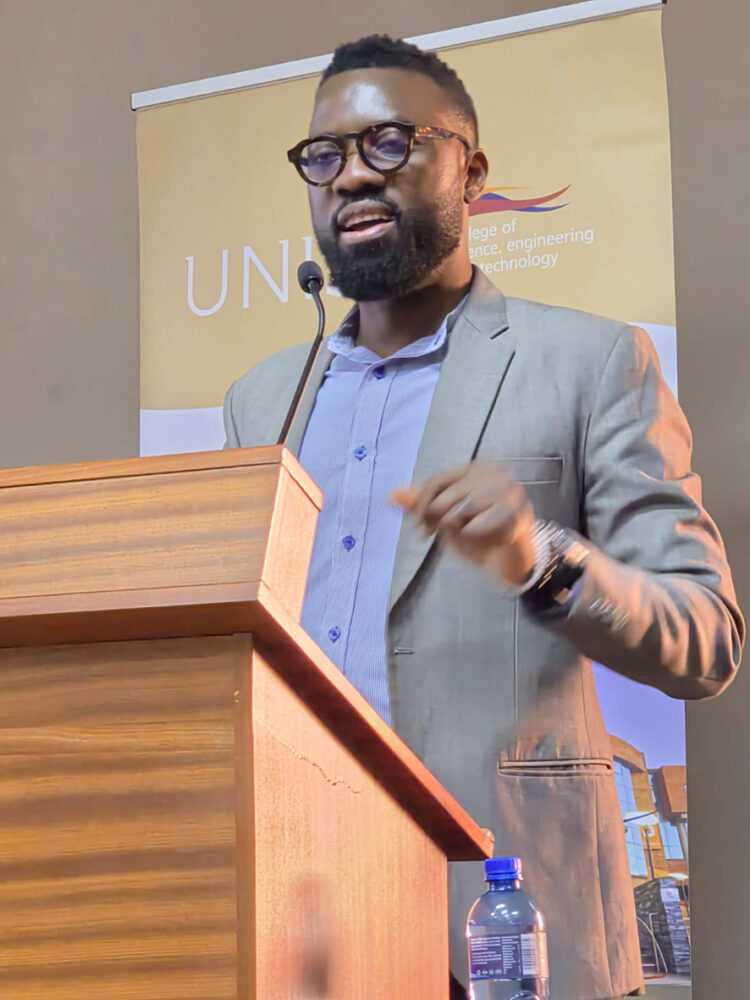 Prof Olaniyi Amos Fawole’s lab transforms agricultural waste into shelf-stable ingredients, antimicrobial coatings and biodegradable packaging to strengthen Africa’s food systems.
Prof Olaniyi Amos Fawole’s lab transforms agricultural waste into shelf-stable ingredients, antimicrobial coatings and biodegradable packaging to strengthen Africa’s food systems.
In South Africa’s largest commercial pomegranate packhouse in Limpopo, workers apply an invisible coating to thousands of fruits destined for export. Made from cactus mucilage and fruit waste, the biodegradable coating may seem unremarkable but it’s a powerful tool in reducing food waste and reshaping Africa’s agricultural future.
“Up to half of Africa’s fresh produce is lost after harvest, largely due to avoidable inefficiencies in storage, handling, and processing,” says Prof Olaniyi Fawole, this year’s winner of the NSTF-ARC Award for his pioneering work in postharvest science. “We don’t just need to grow more, we need to protect the harvest.”
As founding director of the Postharvest and Agroprocessing Research Centre (PARC) at the University of Johannesburg, and SARChI Chair in Sustainable Preservation and Agroprocessing Research, Fawole is leading a shift toward climate-smart, resource-efficient food systems. As co-chair of the All Africa Postharvest Congress and Exhibition, he also helps shape continental strategies to reduce food loss.
His lab transforms agricultural waste — pomegranate peels, beetroot pomace and passion fruit rinds — into shelf-stable ingredients, antimicrobial coatings and biodegradable packaging. One such coating is already being piloted commercially to extend the shelf life of export fruit.
“We’re replacing synthetic preservatives and plastics with nature-based alternatives,” he explains. “Our work strengthens food systems environmentally, economically, and socially.”
What sets Fawole apart is not only his innovation but his inclusive approach. His team collaborates with smallholder farmers, rural agri-enterprises and major market players like the Johannesburg Fresh Produce Market, the largest in Africa, to co-develop practical, scalable solutions.
“Science must be grounded in real-world context,” he says. “Communities and industry stakeholders aren’t passive recipients, they’re active collaborators in the research process.”
This ethos underpins his partnership with the Agricultural Research Council, which has led to the establishment of three innovation hubs focused on postharvest loss reduction, agro-waste valorisation and indigenous knowledge-based product development. Nineteen postgraduate students, most of them women and first-generation scholars, are working on projects ranging from bioactives for animal health to biopackaging from farm waste.
The environmental impact is significant. “Our technologies reduce food waste and greenhouse gas emissions, promote circularity, and lower the need for cold chains,” Fawole explains.
In a continent where infrastructure is often lacking, these low-tech, high-impact innovations are crucial.
While the goal is to save food, it’s also about creating opportunity. By stabilising surplus crops through dehydration or converting blemished produce into dried, high-value goods, farmers can tap into off-season and export markets. “This is about economic empowerment,” he says.
Since 2013, Fawole has trained more than 45 postgraduate students. He now aims to mentor 100 PhD candidates in the next decade.
“Africa is home to 17% of the global population but contributes less than 2% of the world’s scientific research,” he says. “We must build a new generation of scientists who can lead innovation, inform policy and transform agri-food systems.
“Professionally, this award will serve as a powerful enabler. Personally, it has renewed my motivation to continue building bridges between research and practice and to advocate for science-driven development across Africa.”
Data for Research Award
The whale whisperers
Four decades of pioneering data and observing patiently are decoding our changing oceans
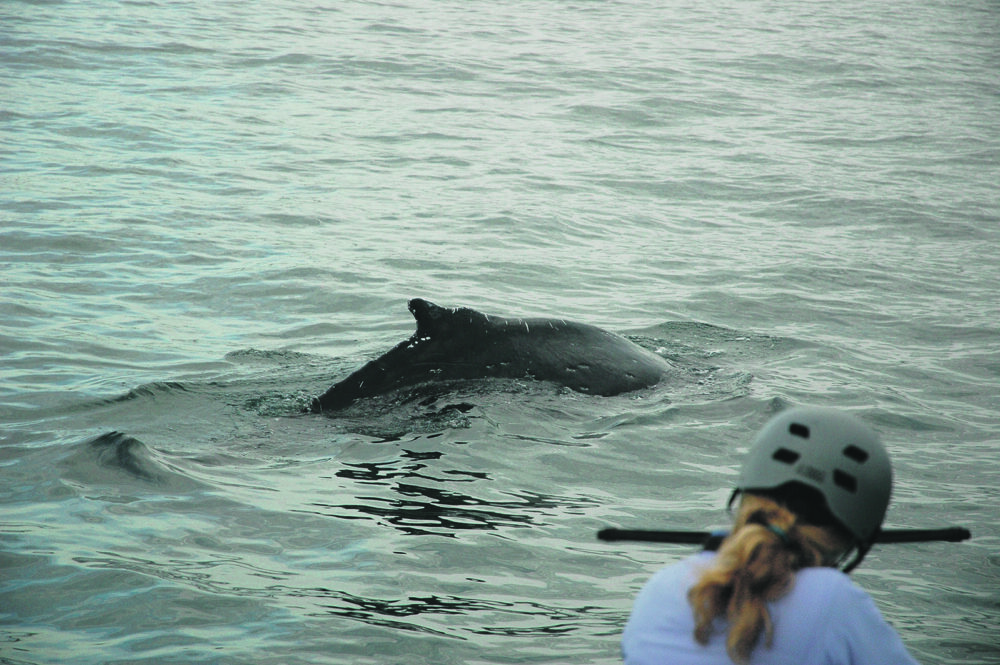 For the past four decades, the Mammal Research Institute (MRI) Whale Unit has been instrumental in ocean conservation through its comprehensive monitoring programmes.
For the past four decades, the Mammal Research Institute (MRI) Whale Unit has been instrumental in ocean conservation through its comprehensive monitoring programmes.
In the vast expanses of South Africa’s coastal waters, a team of dedicated scientists has been quietly conducting one of the world’s most important marine mammal studies. For nearly 40 years, the Mammal Research Institute (MRI) Whale Unit at the University of Pretoria has been watching whales and what they’ve learned is transforming our understanding of ocean health and climate change.
“We study whales not just to protect them, but because they’re indicators of something much bigger,” explains Dr Els Vermeulen, the unit’s research manager. “When whale populations change, it often reflects shifts in the entire ocean ecosystem.”
Since 1969, the Whale Unit has tracked southern right whales with extraordinary consistency. Their long-term data has revealed worrying trends: fewer calves, shifting migration patterns and declining body condition — all linked to warming seas and reduced prey in Southern Ocean feeding grounds.
This uninterrupted aerial survey, among the world’s longest-running whale monitoring programmes, has produced a dataset so robust it’s reshaping how scientists understand the ocean and how policymakers protect it. It also earned the unit the Data for Research Award.
“Short-term studies would never have picked this up,” Vermeulen notes. “Because we’ve tracked them over decades, we can draw clear connections between what’s happening in the ocean and how whales are responding.”
What began as a simple observation project has grown into a multidisciplinary research powerhouse. Today, drones capture high-resolution images without disturbing the animals, satellite tags monitor their movements across thousands of kilometres and genetic and hormone analyses provide insight into health and stress levels.
“Technology has transformed what’s possible,” Vermeulen says, “but it’s the patient, long-term approach that gives our research its power.”
Beyond academia, the Whale Unit’s data is helping shape policy. It informs SA’s Biodiversity Management Plan for the endangered Indian Ocean humpback dolphin, guides the identification of Important Marine Mammal Areas and contributes to international frameworks such as the International Whaling Commission and the Convention on Migratory Species.
Education and mentorship are also central to their mission, with a strong emphasis on developing young scientists, especially women and underrepresented groups, to carry this work forward.
The team’s next major step is the establishment of the South African Whale Centre, which is envisioned as a public hub where science meets society through storytelling: “We want people to understand why marine conservation matters, and how each of us can help protect our oceans.”
Despite their impact, the team operates on what Vermeulen describes as “insecure funding and a shoestring budget”. Their dedication fills the gap, powered by “a shared sense of purpose and an unwavering commitment to whale conservation”.
Winning the Data for Research Award honours both legacy and future.
“It recognises the passion, resilience, and hard work of every team member, past and present, and serves as a tribute to the late Prof Peter Best and his enduring vision for whale science in SA,” says Vermeulen.
“Whales are sentinels of ocean health. By listening to what they’re telling us, we have a chance to act – not just for them, but for the entire ocean.”
Innovation Award: Corporate Organisation
From idea to industry
Stellenbosch’s Innovation and Commercialisation Unit turns academic research into real-world solutions
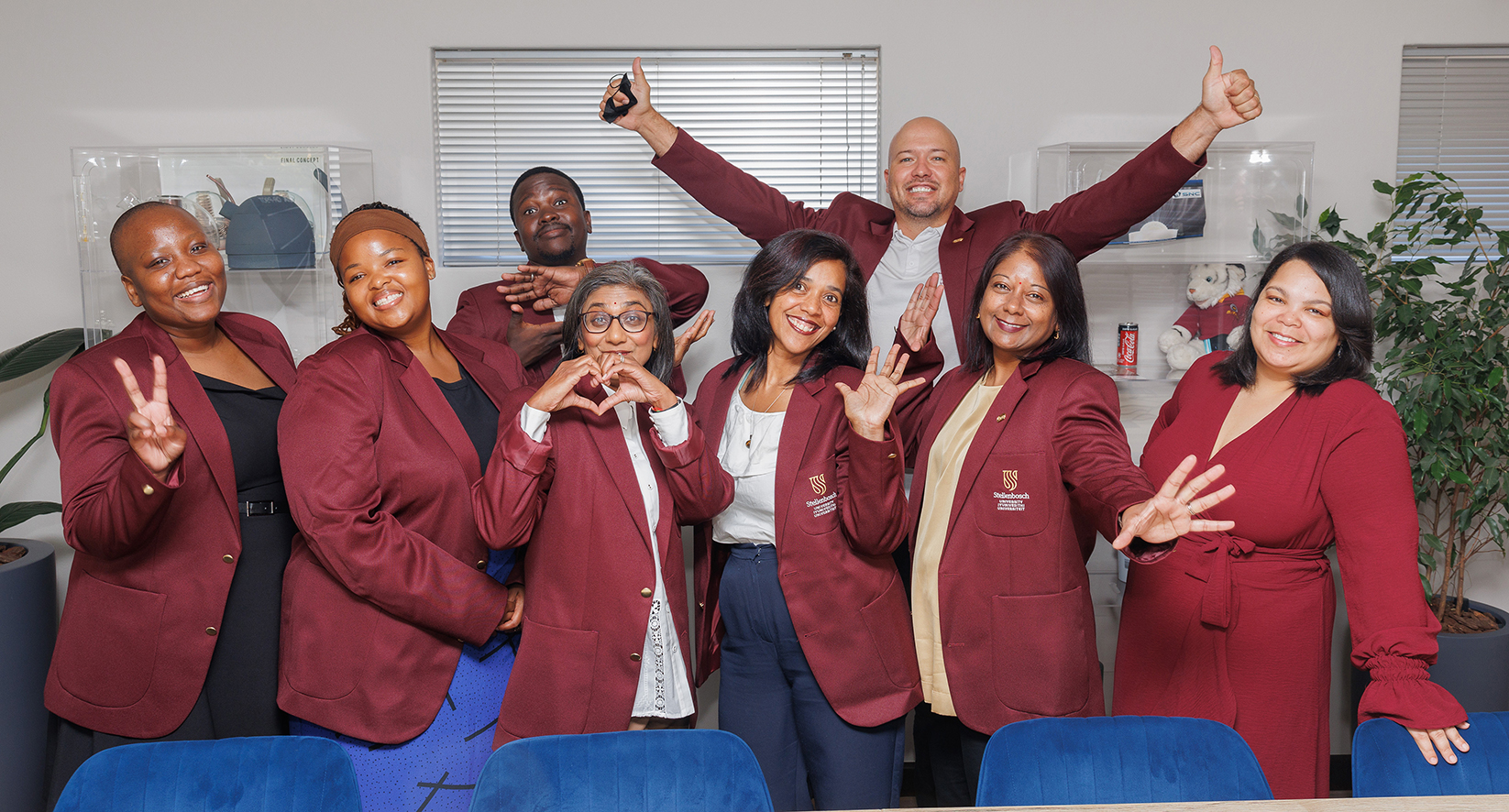 SU’s Innovation and Commercialisation Unit works with research teams to show what is possible when academic excellence meets entrepreneurial intent.
SU’s Innovation and Commercialisation Unit works with research teams to show what is possible when academic excellence meets entrepreneurial intent.
While many universities stop at research and publication, Stellenbosch University (SU) has built a dynamic ecosystem that takes ideas from the lab bench to the launch pad, creating more than 30 thriving spin-out companies and Africa’s first university-focused venture capital fund in the process.
With a powerhouse model uniting research, business and technology, the university’s Innovation and Commercialisation Unit is turning academic research into global ventures, earning it the prestigious NSTF-South32 Award for Innovation through a Corporate Organisation.
Led by chief director Anita Nel, the unit comprises three key components: the Innovus Technology Transfer Office (TTO), which manages intellectual property (IP); the LaunchLab, which provides incubation services; and University of Stellenbosch Enterprises (USE), which forms and nurtures spin-out companies. This threefold approach ensures that promising innovations don’t fall through the cracks.
At the heart of their work is a philosophy summed up by Post-it Note team member Geoffrey Nicholson: “Research transforms money into knowledge. Innovation transforms knowledge into money.”
“Our job is to make innovation matter,” says Ravini Moodley, the director of the TTO. “South Africa is full of brilliant researchers. What we’ve built is a system to help them commercialise their ideas, protect their IP, and launch ventures that solve real-world problems.”
That system includes IP training, investor-readiness coaching, startup platforms and translational funding. Signature tools such as the Spin-Out Guide, Instant Startup Platform and Translational Fellow Programme help remove friction from the innovation pipeline and turn postgraduate research into market-ready ventures.
The results are compelling. CubeSpace manages more than 300 satellites globally, including systems endorsed by NASA. Stellenbosch Nanofibre Company partners with international firms such as Taiki USA to produce nanofiber-based medical and skincare products. Urobo Biotech converts bioplastic waste into high-value materials and Banzifeet creates anatomically designed school shoes based on paediatric foot research.
“What sets us apart is our systematic approach,” says Moodley. “A gap in the literature is not always a gap in the market. We help researchers understand both.”
Their impact goes beyond spin-outs. The unit conceptualised and raised the University Technology Fund (UTF), Africa’s first venture capital fund focused on university-born technologies. Fund 1 closed in 2024 after investing in six institutions. Fund 2 is already backing new ventures with an expanded scope that includes alumni-led startups.
Each spin-out is mapped to the United Nations sustainable development goals, and the university tracks metrics such as job creation, turnover and ecosystem growth. With a 69% spin-out survival rate over 26 years, which is well above global averages, they are proving that innovation can be both scalable and sustainable.
“Innovation means translating ideas into impact — commercial, societal, or environmental,” Moodley says. “We’re not just building companies. We’re building a culture of innovation that uplifts society and strengthens SA’s knowledge economy.”
For aspiring innovators, her advice is clear: “Start with curiosity, but align your innovation with a real-world need. Seek market feedback and don’t be afraid of difficult questions.”
Winning the NSTF-South32 Innovation Award is validation for what the unit has achieved. As Moodley puts it, their work goes beyond revenue: “It’s about building a sustainable innovation culture that uplifts society, contributes to economic development, and showcases what SA can offer the world when academic excellence meets entrepreneurial intent.”
Innovation Award: Small, medium and micro enterprise (SMME)
Healing through heritage
Prof Namrita Lall translates traditional wisdom into modern medicine
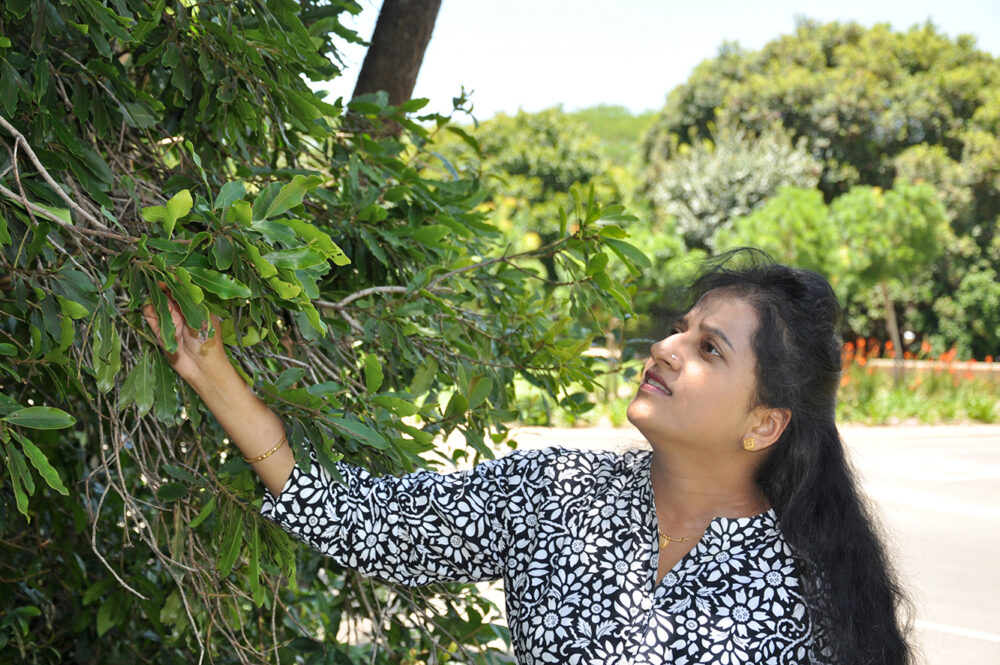 Prof Namrita Lall says that at the heart of her success – more than 40 patents and research that ranks in the top 1% globally – lies an unwavering belief in the healing power of plants
Prof Namrita Lall says that at the heart of her success – more than 40 patents and research that ranks in the top 1% globally – lies an unwavering belief in the healing power of plants
Prof Namrita Lall has turned a childhood belief in the healing power of plants into a groundbreaking career in science, innovation and community upliftment.
“I grew up using alternative plant-based medicines for things like indigestion and headaches,” says Lall, who is DSTI/ NRF Research Chair in Phytomedicine at the University of Pretoria and the winner of the NSTF-South32 Award for Innovation through an SMME.
That early faith has blossomed into more than 30 prototypes and commercialised products, more than 40 patents, and research that ranks in the top 1% globally in pharmacology and toxicology.
Despite South Africa being one of only 17 megadiverse countries with 10% of the world’s known plant species, few have been transformed into commercial health products. Lall’s mission is changing that through rigorous research and local partnerships.
Her innovations span natural treatments for cancer and drug-resistant TB, cosmeceuticals for pigmentation and ageing, and SA’s first plant-based oral care solution targeting periodontal disease. One compound, 7-methyljuglone, ranks among the top three natural products globally for TB treatment, while Limunone is now sold in pharmacies nationwide.
Each formulation undergoes rigorous lab work, human clinical trials, and safety testing. But for Lall, innovation extends beyond science. “These enterprises using my research aren’t just spin-outs; they’re engines of local economic development.”
Companies such as Letago Pharmaceuticals, Valoren Cosmetics and Muthi Futhi in KwaZulu-Natal create jobs, empower women, and help communities benefit from commercialising local biodiversity.
Lall bridges the academic and commercial worlds uniquely. Her students – predominantly women from historically disadvantaged backgrounds – learn intellectual property, market analysis, regulatory compliance and product development.
The most exciting part? “Our students are not only getting a degree, we’re actually doing something that could benefit mankind.”
Community engagement remains central. Lall views intellectual property as crucial for protecting indigenous knowledge and community interests. “We follow SA’s bioprospecting and benefit-sharing legislation closely. The communities where we work are always involved and benefit from scientific validation of their ancestral wisdom.”
Her plant selection follows two approaches: ethnobotanical selection based on traditional community uses and phytochemistry-driven selection targeting plants rich in specific compounds.
“We test these to see if we can validate their medicinal value,” she explains, emphasising the importance of scientific validation for traditional knowledge.
The journey hasn’t been easy. Unpredictable plant compounds, limited trial funding, and balancing family with academic demands create significant challenges. “A lot of women carry a heavy burden of guilt. When we’re at work, we’re thinking about home, and at home, we’re thinking about work. It’s about finding balance and perspective.”
She says it takes hard work to achieve success. “Of course, it helps if you are passionate about what you do; this helps one handle the pressures and disappointments a lot better.”
Winning the Innovation Award extends beyond her individual achievements to the communities, students and traditions behind every breakthrough.
“Recognition like this, especially for women researchers, showcases our valuable contributions to science and provides us with exposure,” she says. “My work is not just about the research. It’s about restoring value to our traditional knowledge, empowering women and youth, and creating products that the world needs.”
Communication Award
The voice for the dead
Forensic pathologist Prof Ryan Blumenthal turns autopsy tables into classrooms for the living
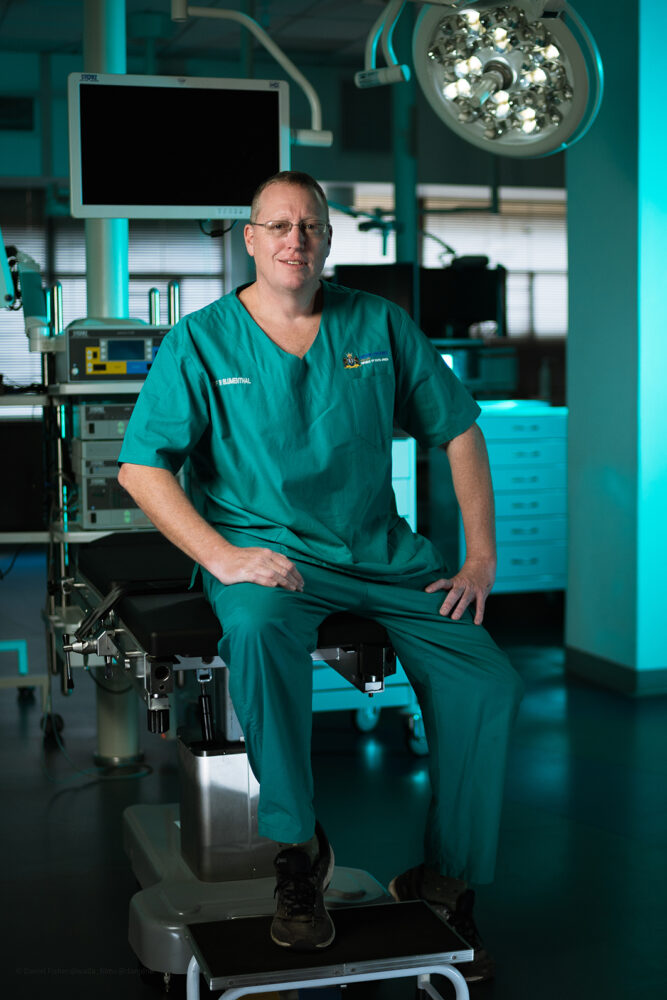 Through his books, documentary series, conferences and YouTube channel, forensic pathologist Prof Ryan Blumenthal shares lessons from the dead to improve the lives of the living.
Through his books, documentary series, conferences and YouTube channel, forensic pathologist Prof Ryan Blumenthal shares lessons from the dead to improve the lives of the living.
When Prof Ryan Blumenthal speaks about death, it’s with a reverence that makes the living sit up and listen. In the sterile silence of the mortuary, he has found his calling as a voice for those who can no longer speak.
A senior specialist forensic pathologist and associate professor at the University of Pretoria, this year’s NSTF-South32 Communication Award winner is on a mission to share the lessons of the dead with the living, transforming one of medicine’s most misunderstood fields into a platform for public education and social impact.
“Forensic pathologists are not just doctors, scientists or academics. We are a special kind of medical expert,” he says. “We do not break. We do not quit. We do what must be done.”
An autopsy is more than a medical procedure, it’s a search for meaning, justice and, often, closure. “There are lessons to be learned about life when studying death. We perform autopsies not just to catch criminals, but to prevent unnecessary deaths. The same type of death should never happen twice.”
This belief underpins his communication mission. “I think what separates my work from other forensic pathologists is that I focus on life, whereas they focus on death,” he says. “By using clear, relatable language and storytelling, I simplify complex or emotional topics while staying true to the science — respecting both the facts and the audience.”
This has driven him to become an unlikely public educator, translating the complex world of forensic pathology into accessible narratives that captivate audiences from seven to 96 — the youngest and oldest readers of his bestselling book Autopsy, recently translated into Russian. His outreach spans books, documentaries, viral TikTok videos and more, all with the same goal: sharing lessons for the living from the autopsy table.
Blumenthal’s approach is as much philosophical as it is scientific. He distinguishes between “autopsies of documentation” and “autopsies of discovery” — the latter unlocking mysteries that challenge conspiracy theories, reveal hidden conditions and drive medical innovation.
“Forensic pathology is a powerful tool to combat misinformation. There will always be a need for truth and integrity in society,” he says. His work is not a job but a calling. “Even though I’m a forensic pathologist, I’m still a doctor. I took the Hippocratic Oath, and I must safeguard the health and safety of the community.”
Science communication, he explains, is one way to honour that oath and redress the imbalance in how society processes violent death. “The focus is almost always on the killers; even the court cases bear the names of the murderers, not those who died. It feels wrong.”
Despite the emotional and physical toll of his work, which is often “exhausting, dirty, backbreaking, dangerous”, Blumenthal finds meaning in the intellectual challenge and human impact. “When I’m not performing autopsies or teaching, my life feels empty. I’ve been driven by an addiction —pure and simple — to truth and justice.
“Forensics bridges the gap between science and society,” he says. “Winning this award affirms that my efforts in public science communication have contributed meaningfully to societal progress.”
He emphasises that effective science communication requires the same methodical approach as an autopsy — careful, thorough, and always in service of the community. The dead still have something to say, and he’s here to make sure we hear them.
Non-Governmental Organisation (NGO) Award
Science in their own language
AmaQawe ngeMfundo shatters language barriers to enable greater access to science education
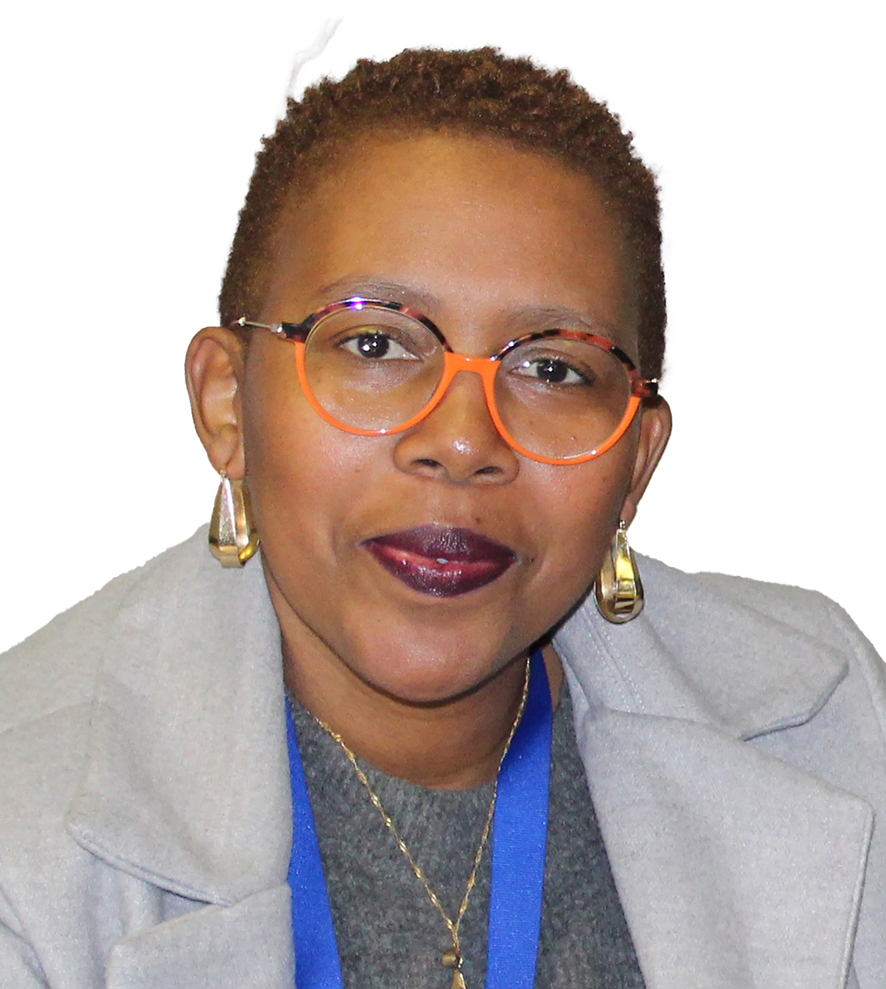 Associate Prof Fanelwa Ngece-Ajayi says AmaQawe ngeMfundo empowers marginalised learners by making STEM education accessible to solve real-world challenges in their communities.
Associate Prof Fanelwa Ngece-Ajayi says AmaQawe ngeMfundo empowers marginalised learners by making STEM education accessible to solve real-world challenges in their communities.
In South Africa’s township schools, where science labs are rare and language barriers often stifle curiosity, AmaQawe ngeMfundo (Heroes through Education) is transforming how science is taught — both visually and verbally. The NGO is redefining STEM (science, technology, engineering and maths) access by making science exciting, accessible, and relevant while nurturing a new generation of local problem-solvers.
Founded by Associate Professor Fanelwa Ngece-Ajayi, a physical chemist and deputy dean of research and innovation at the University of the Western Cape (UWC) with a passion for grassroots change, AmaQawe was built on a simple premise: potential exists everywhere, but opportunity doesn’t.
“The project was inspired by the learners themselves,” says Ngece-Ajayi. “They had the potential but lacked the tools, the labs, and often, the belief that STEM was for them.”
To bridge that gap, AmaQawe brings mobile science labs, interactive workshops, and mentorship programmes into under-resourced schools. University students and STEM professionals from similar backgrounds offer not only academic support, but proof that success in science is possible.
Crucially, lessons are delivered in learners’ home languages, like isiXhosa — breaking down one of the biggest barriers to understanding.
“Science shouldn’t feel foreign,” says Ngece-Ajayi. “When learners hear it in their own language, something shifts. They’re more likely to engage, succeed, and pursue STEM further.”
Portable STEM kits turn ordinary classrooms into hands-on laboratories.
Teachers report renewed interest, while learners are asking more questions, applying for science programmes, and returning later to mentor others.
The impact is tangible. A R1 million grant from De Beer Marine helped 35 UWC students — many first exposed to STEM through AmaQawe — complete their studies.
“We measure success not just in degrees, but in confidence, curiosity, and community pride. When learners start asking questions, building experiments, and dreaming in code — that’s success,” says Ngece-Ajayi.
As the programme grows, so does its ambition. Future plans include mobile STEM labs for rural schools, a full STEM curriculum in isiXhosa, virtual mentorship platforms and teacher training initiatives. These efforts aim to ensure that quality science education reaches learners in even the most remote areas.
“Early exposure fosters curiosity, confidence, and foundational thinking skills when young minds are most open to exploration,” she says. “If we do this right, we gain a generation of empowered problem-solvers who can tackle challenges like poverty, disease, and climate change with home-grown solutions. If we don’t, we risk deepening the educational divide, leaving potential untapped, and perpetuating cycles of inequality and exclusion from the global knowledge economy.”
AmaQawe’s work supports national goals for education and innovation, while also standing as a reminder that relevance matters. “STEM becomes powerful when learners see themselves in the field and connect what they’re learning to real-life problems.”
Recognition from the NSTF-South32 Awards could help scale their impact. “It validates our model and inspires our learners. It shows that their dreams are valid and achievable,” she says.
And for those wondering how to help? “Volunteer, donate, mentor, partner. If you believe in equal education, there’s a role for you here.” Because when learners hear science in their own language and see people like them represented, they don’t just participate — they lead.
NSTF-Ukhozi Award
Bridging a nation
Civil engineer Dawie Botha honoured for lifetime of youth development, infrastructure insight and SET impact
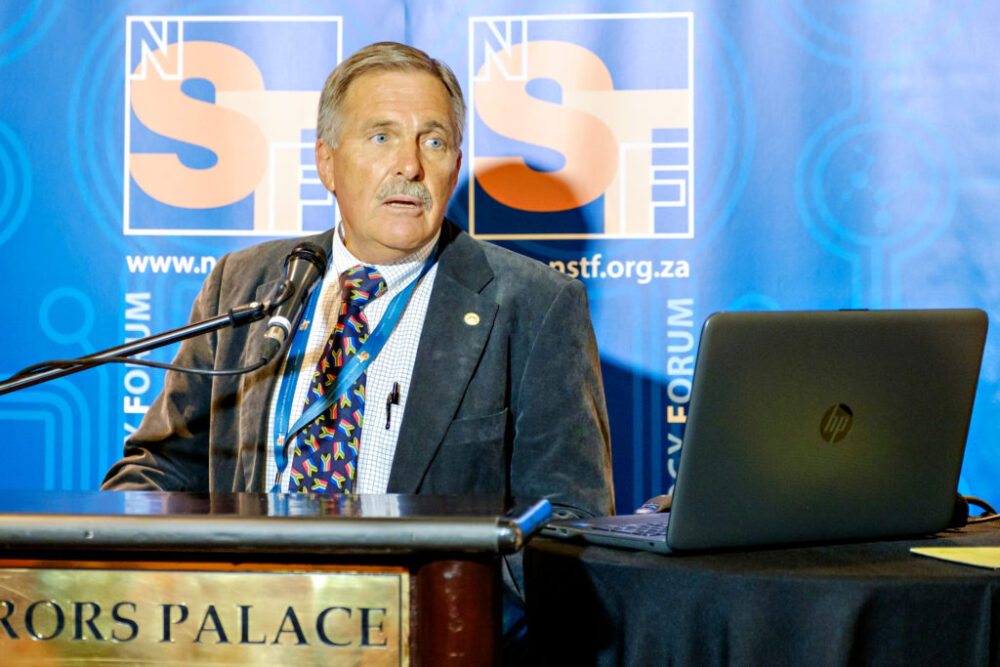 Through leadership, mentorship and visionary thinking, Dawie Botha has been shaping South Africa’s engineering landscape for over five decades.
Through leadership, mentorship and visionary thinking, Dawie Botha has been shaping South Africa’s engineering landscape for over five decades.
David Benjamin “Dawie” Botha has spent his life building South Africa not just in steel and concrete, but through leadership, mentorship and visionary thinking that has shaped the country’s engineering landscape for more than five decades. Now, he’s being honoured with the Ukhozi Award at the 2025 NSTF-South32 Awards for his extraordinary lifetime contributions to SA and to the National Science and Technology Forum (NSTF).
The Ukhozi Award, symbolised by the eagle for its sharp vision and far-reaching impact, recognises individuals whose leadership and influence have left a lasting imprint on SA’s science, engineering and technology (SET) ecosystem. For Botha, a civil engineer raised in the small town of De Aar in the Northern Cape, the honour represents a full-circle moment.
“The day I received a bursary to study civil engineering, my life changed forever,” he recalls, adding how his widowed mother wept tears of joy at the news. “It gave me the foundation to dream — and then to build.”
From the outset of his career in municipal engineering and the SA Housing Trust, Botha quickly became a force for transformation. As executive director of the South African Institution of Civil Engineering (SAICE) from 1991 to 2010, he expanded the organisation’s international footprint and helped establish the Africa Engineers Forum, forging partnerships with leading global institutions like the American Society of Civil Engineers (ASCE) and the UK’s Institution of Civil Engineers.
Botha is perhaps best known for leading the production of SA’s Infrastructure Report Cards — critical assessments of national infrastructure that have informed government policy and investment planning since 2006.
These reports underscore his belief that engineers must be central to national development conversations: “Engineers are responsible for the systems that sustain life and the very source of what a country needs to survive, grow and prosper. They constitute the backbone of a successful country and their work must be recognised, supported, and celebrated.”
An advocate for STEM (science, technology, engineering and maths) education, Botha helped launch the International Bridge Building Competition and AQUALIBRIUM, reaching thousands of learners and inspiring future engineers. His visionary thinking also led to the creation of the STEMulator.org, a digital learning and career guidance tool under the auspices of the NSTF, that introduces school learners to the diverse world of SET careers in a fun, interactive way.
“The future depends on how we inspire and support the next generation,” he says.
As chair of the NSTF’s proSET membership sector and a long-standing member of the NSTF Executive Committee, Botha has built bridges across disciplines and sectors, always championing collaboration, equity and youth development. He was awarded the NSTF Management Award in 2011 and in 2014 authored Travels with Civils, a guide to infrastructure across SA’s nine provinces.
Humble about his accolades, Botha attributes his success to faith, teamwork and a belief in the power of science and engineering to uplift society.
“This award isn’t just about me,” he says. “It’s about the learners, professionals, and communities who made this journey meaningful. I’m honoured to have walked alongside them, and thank God for my talents and opportunities.”